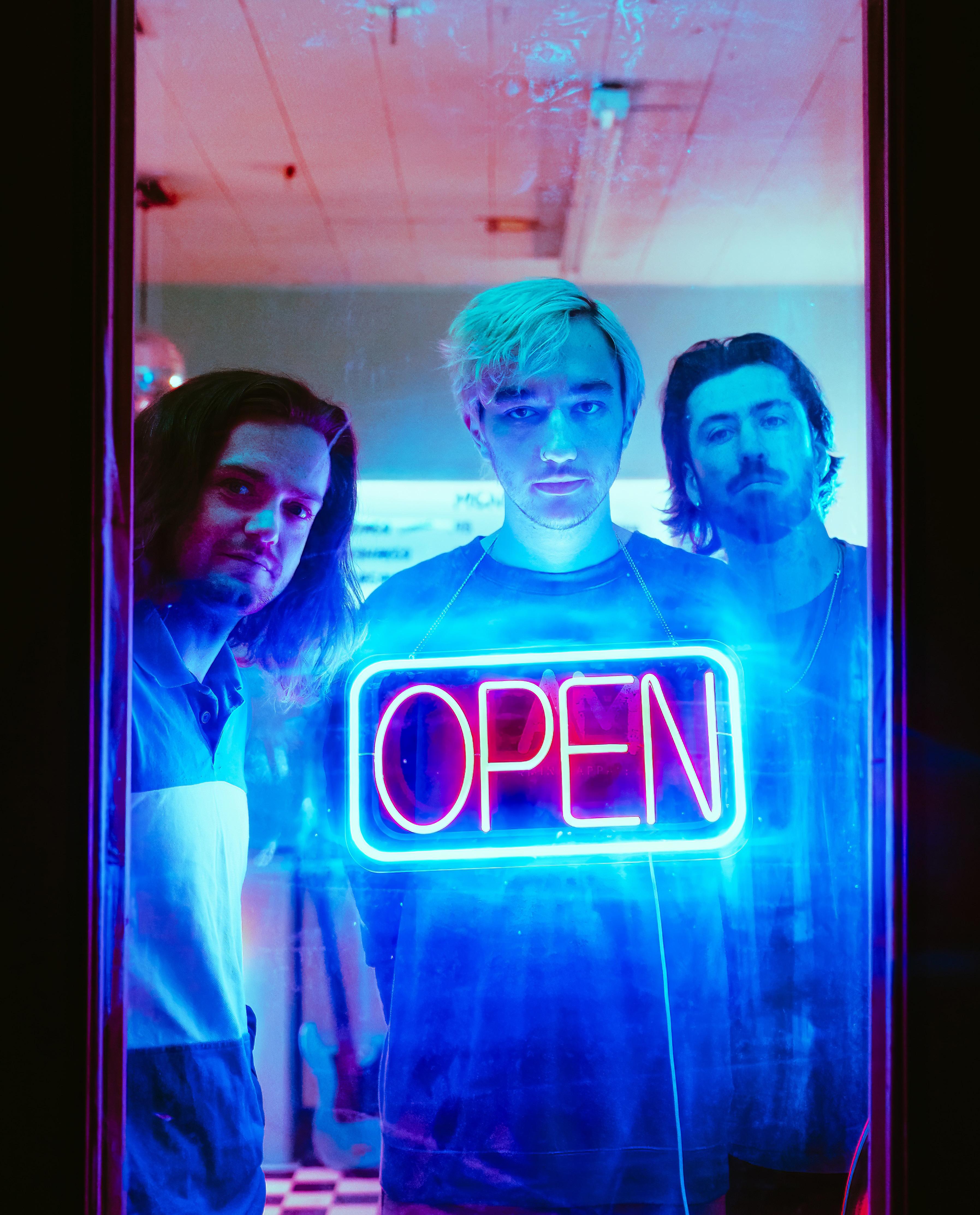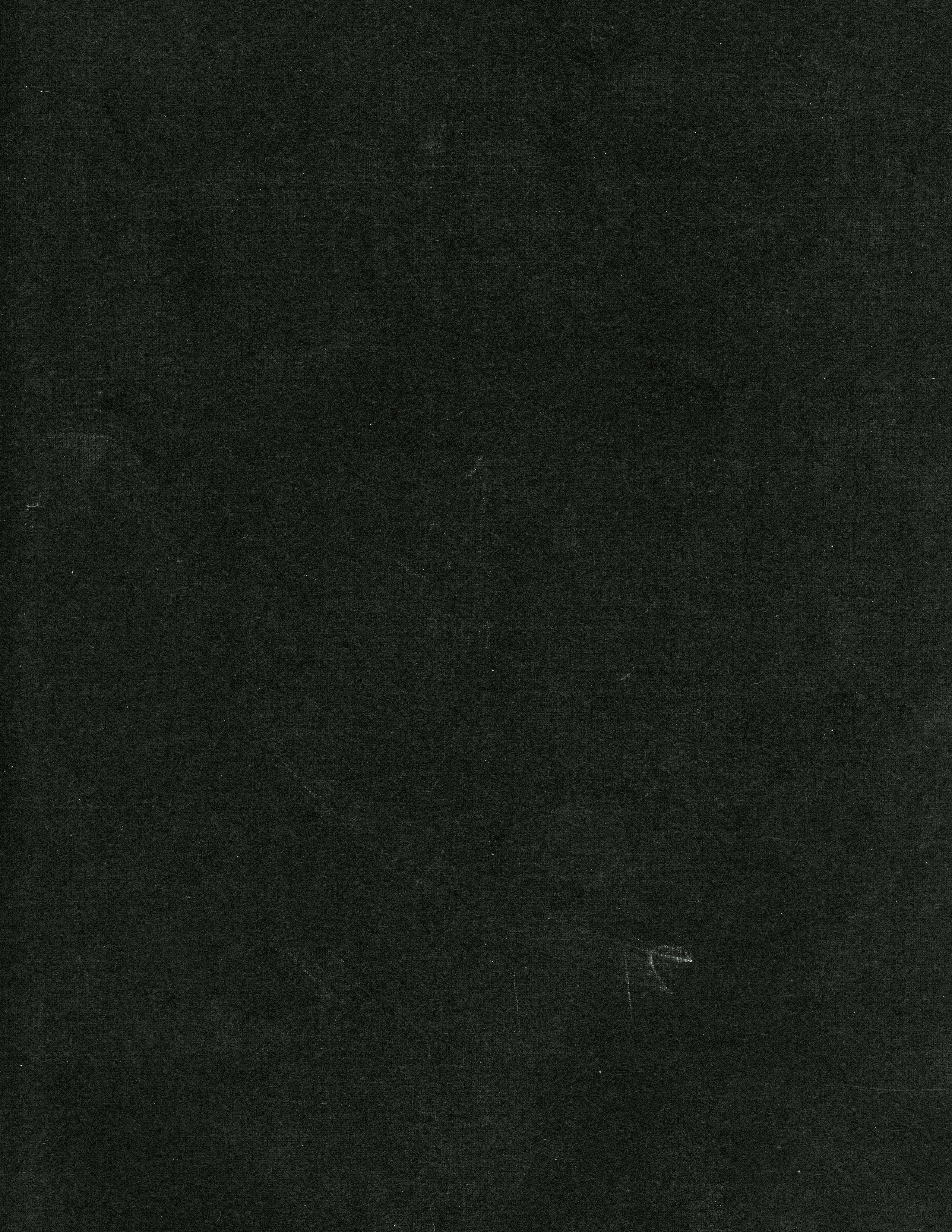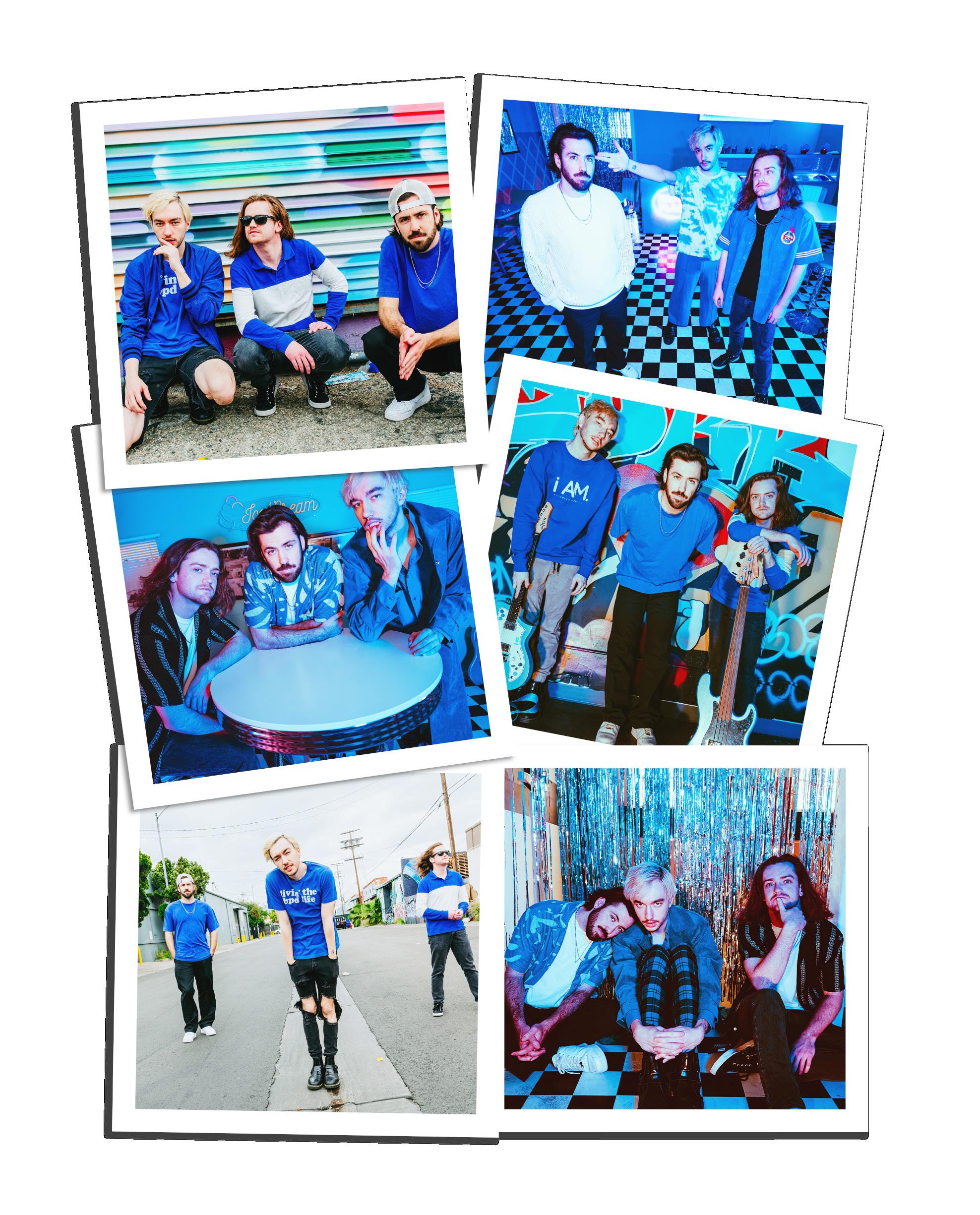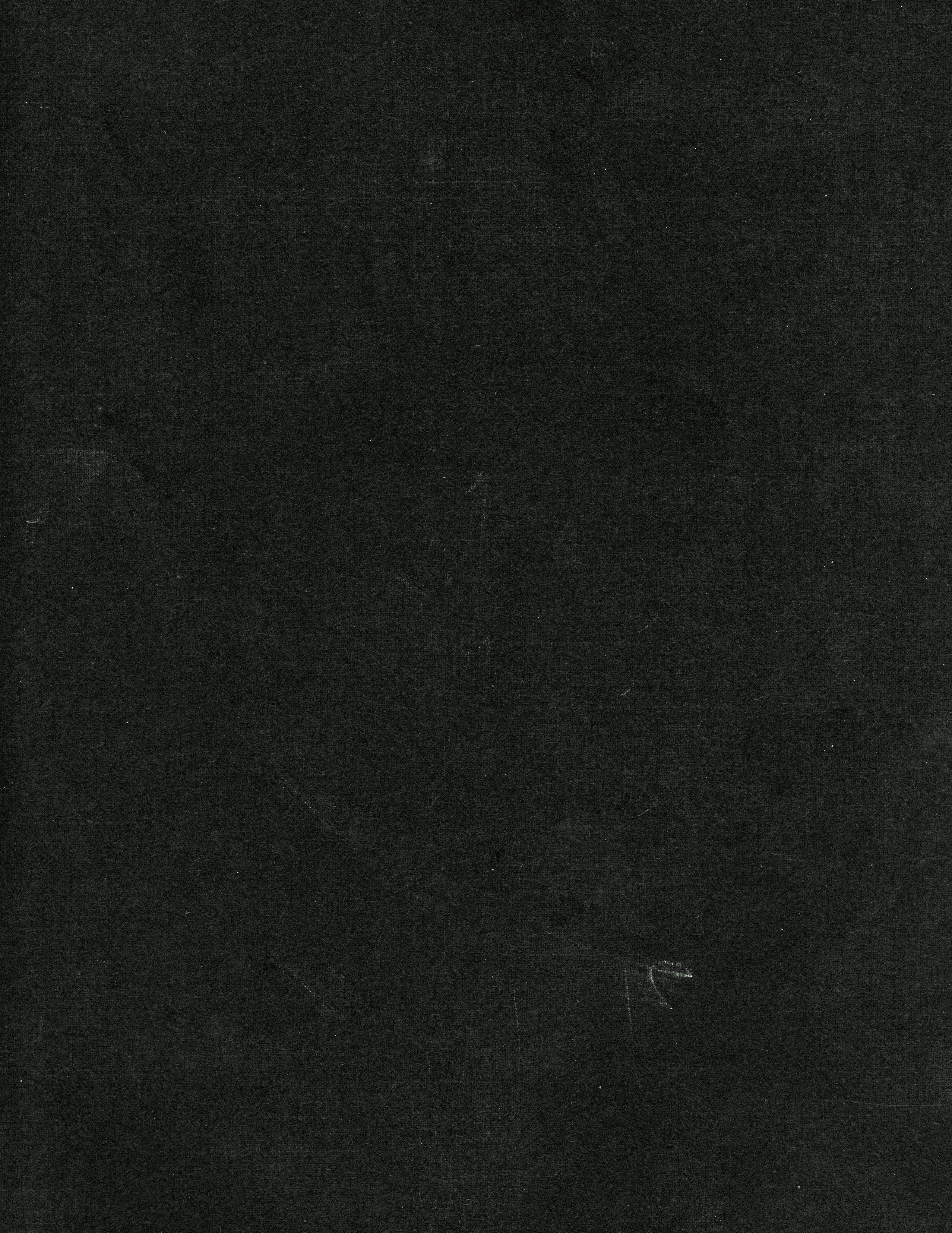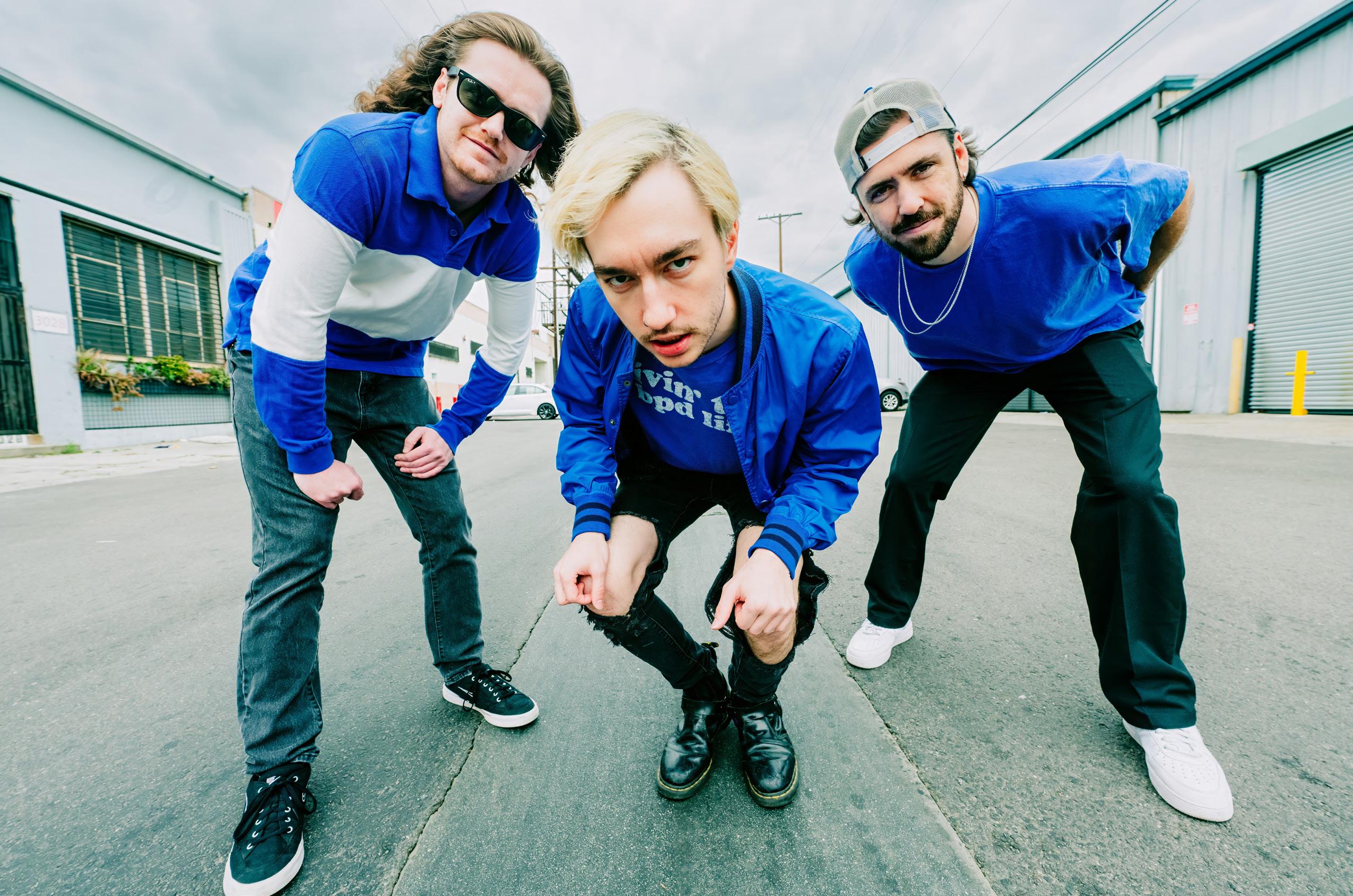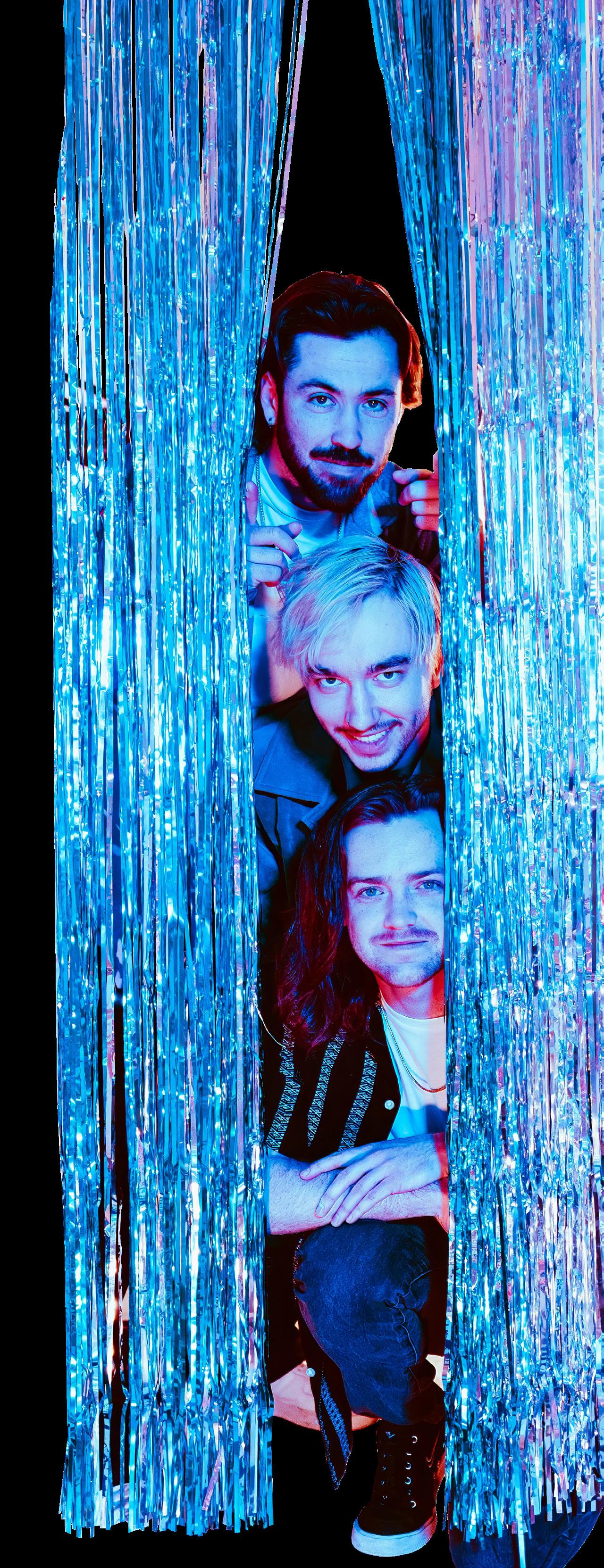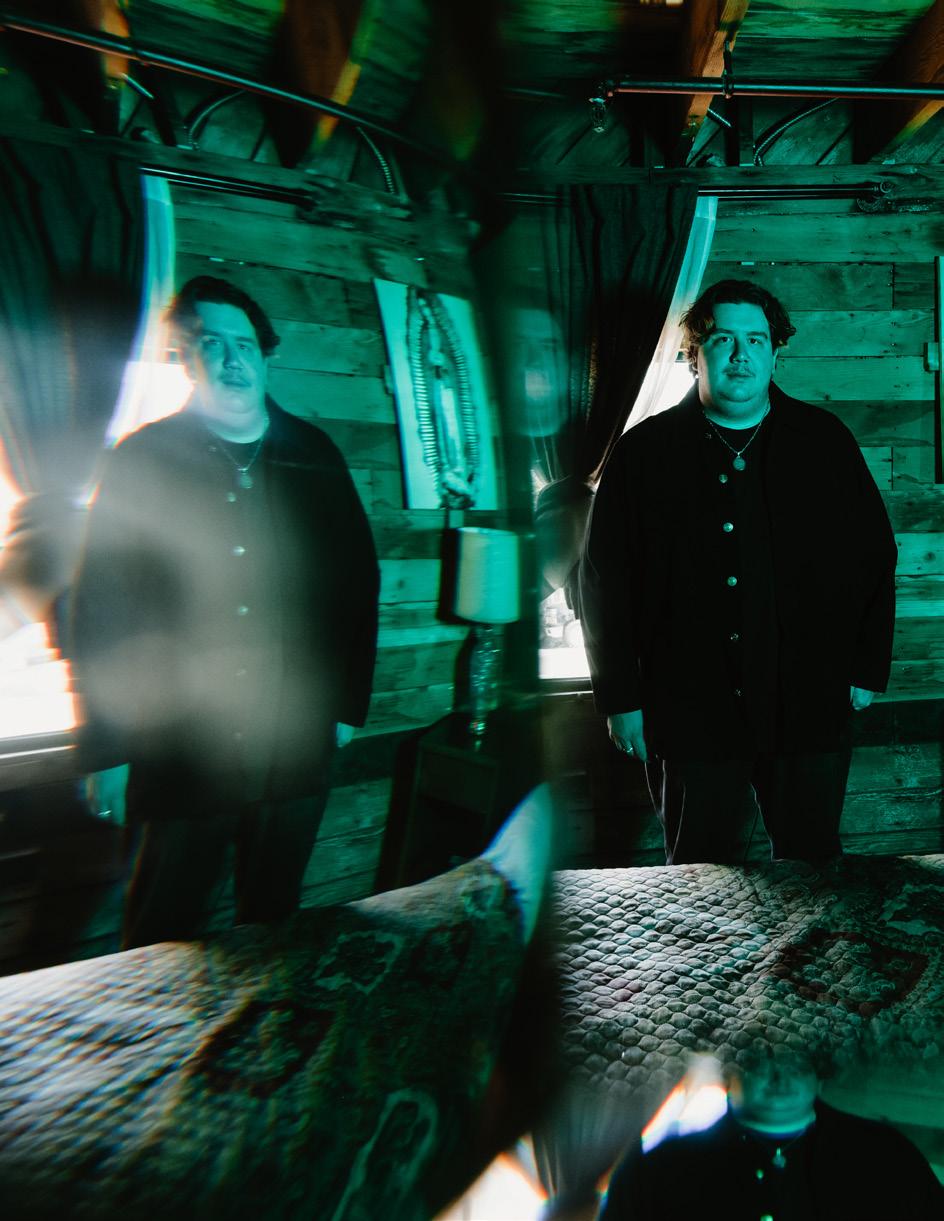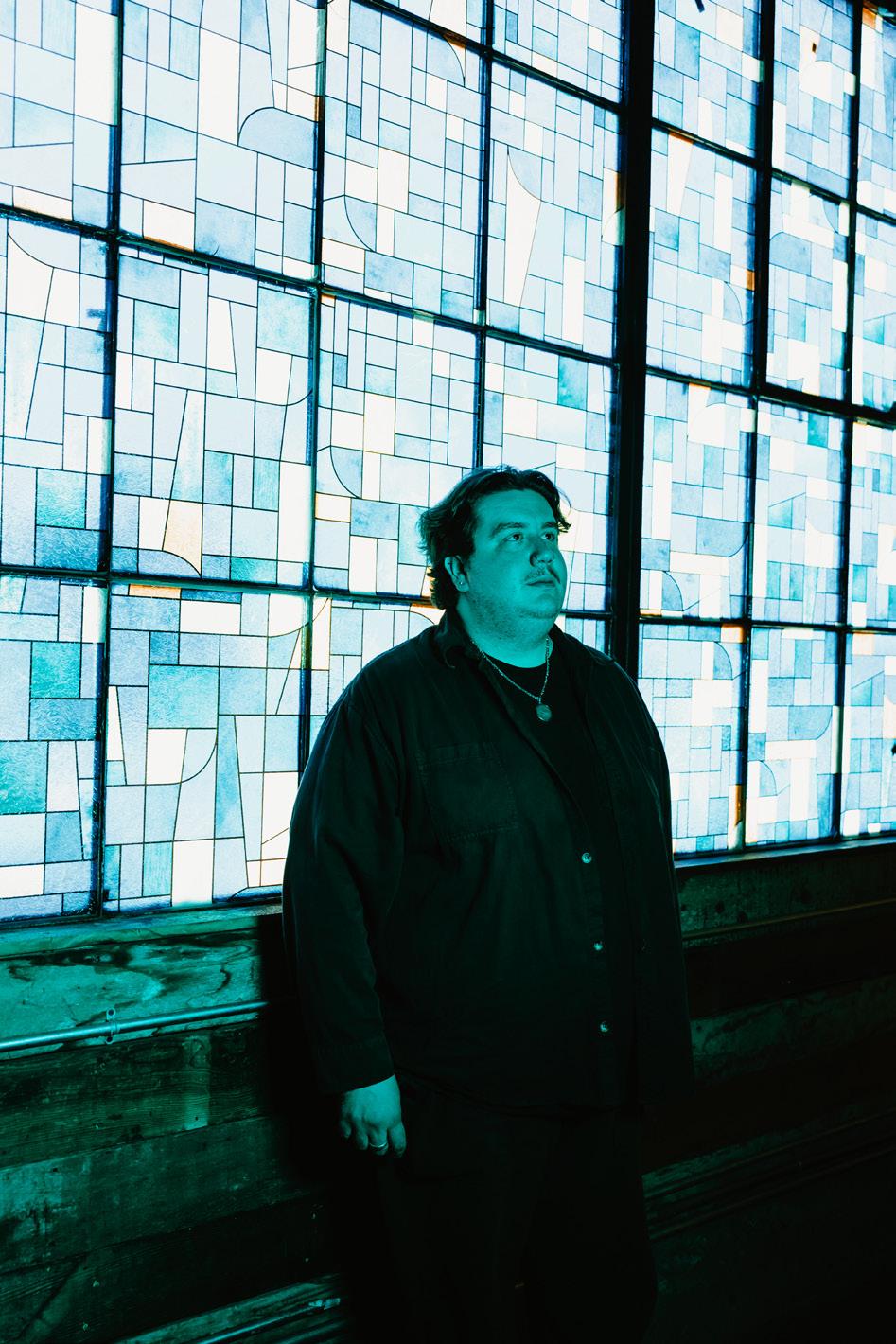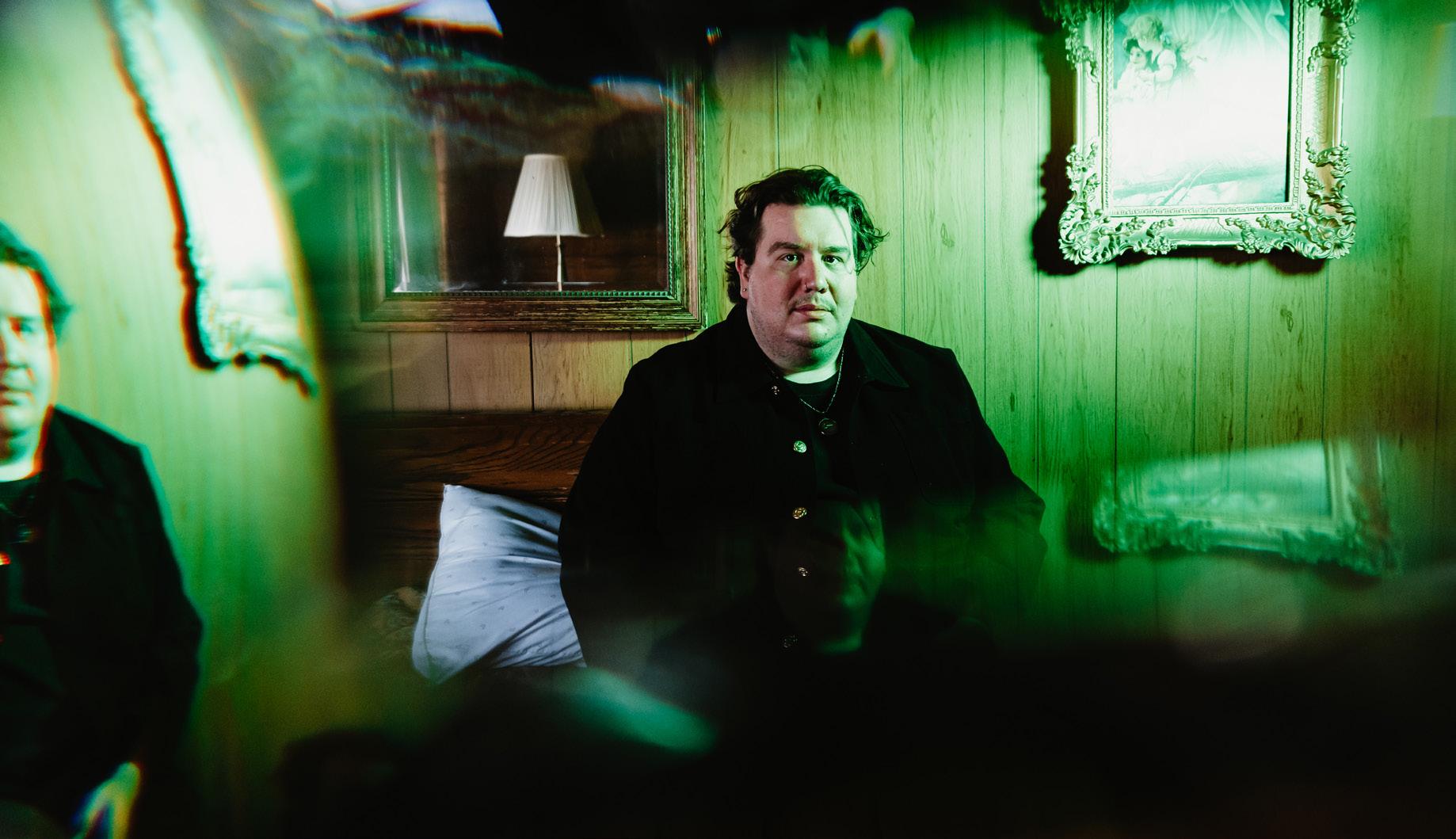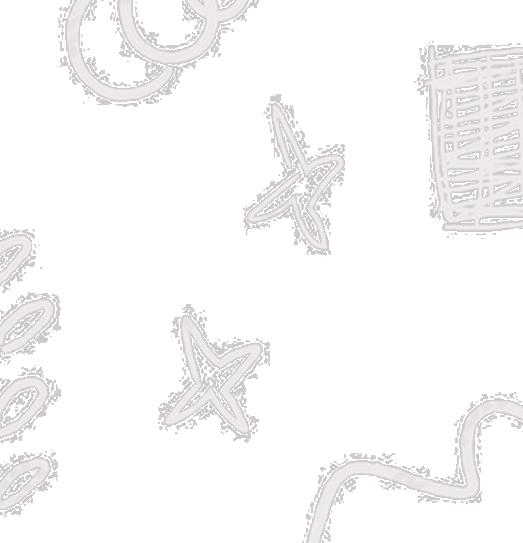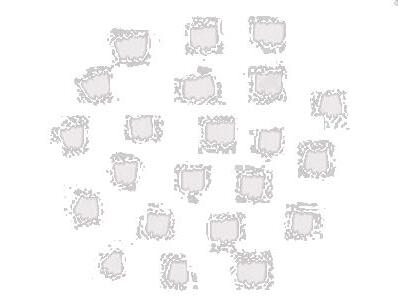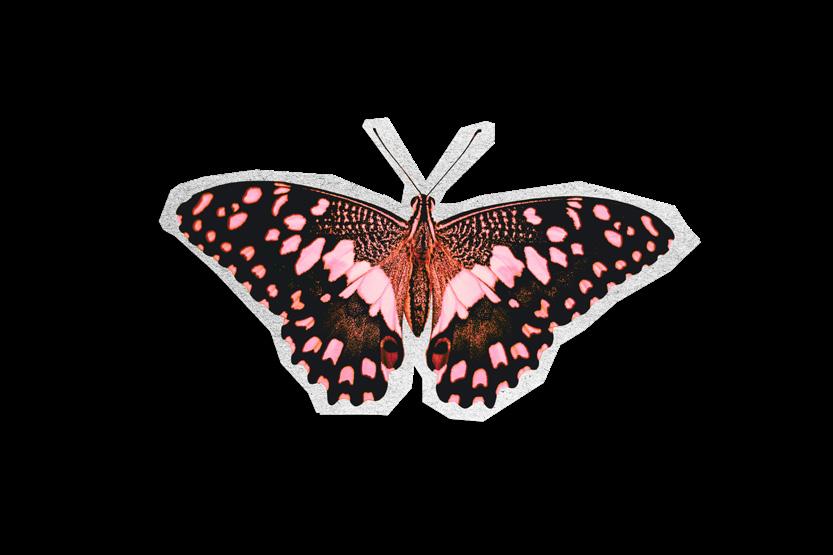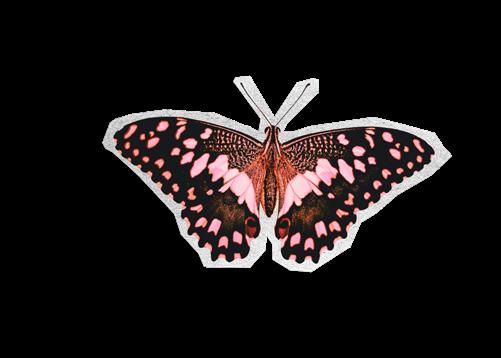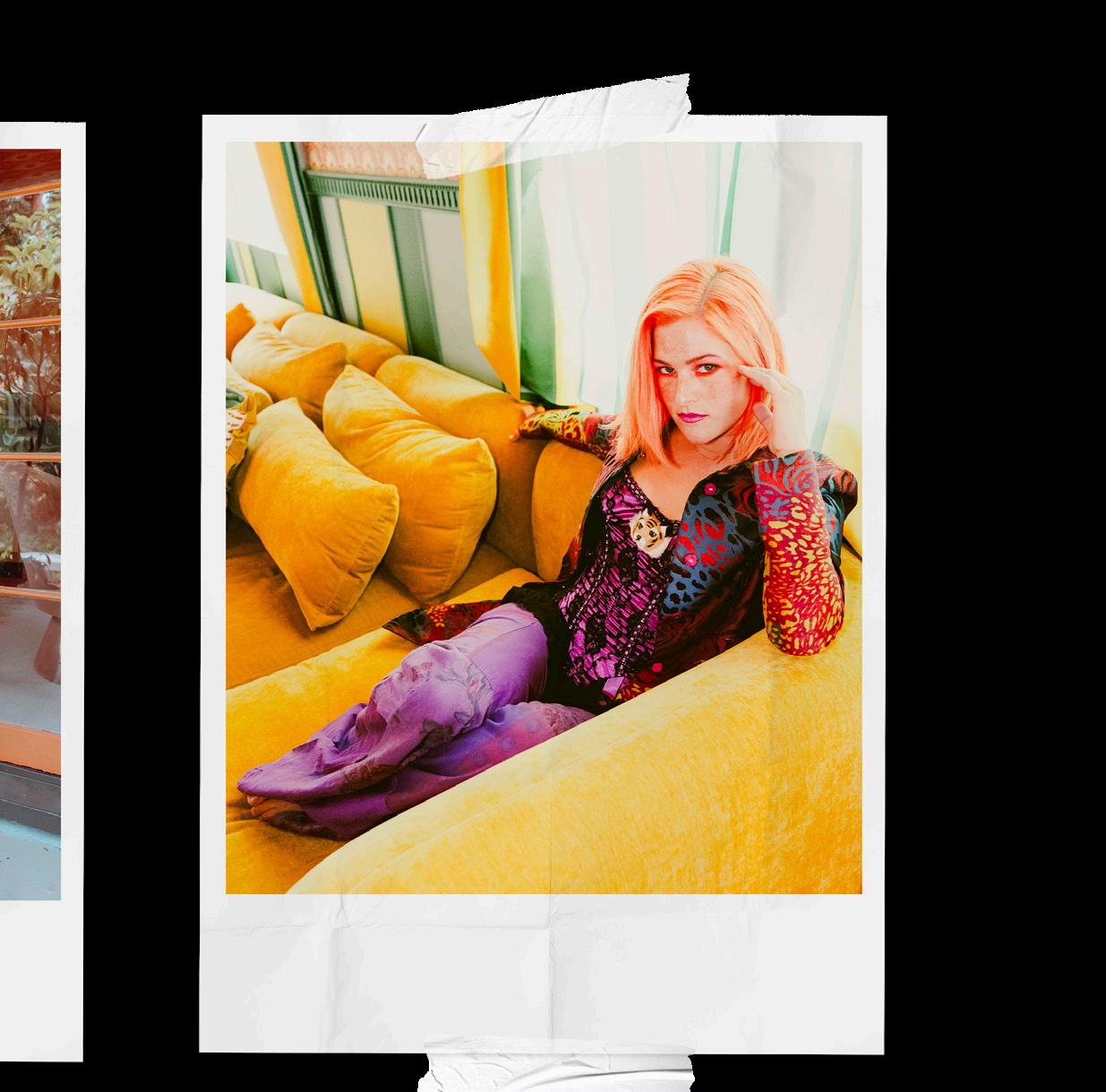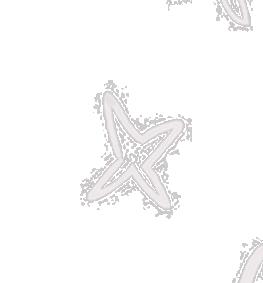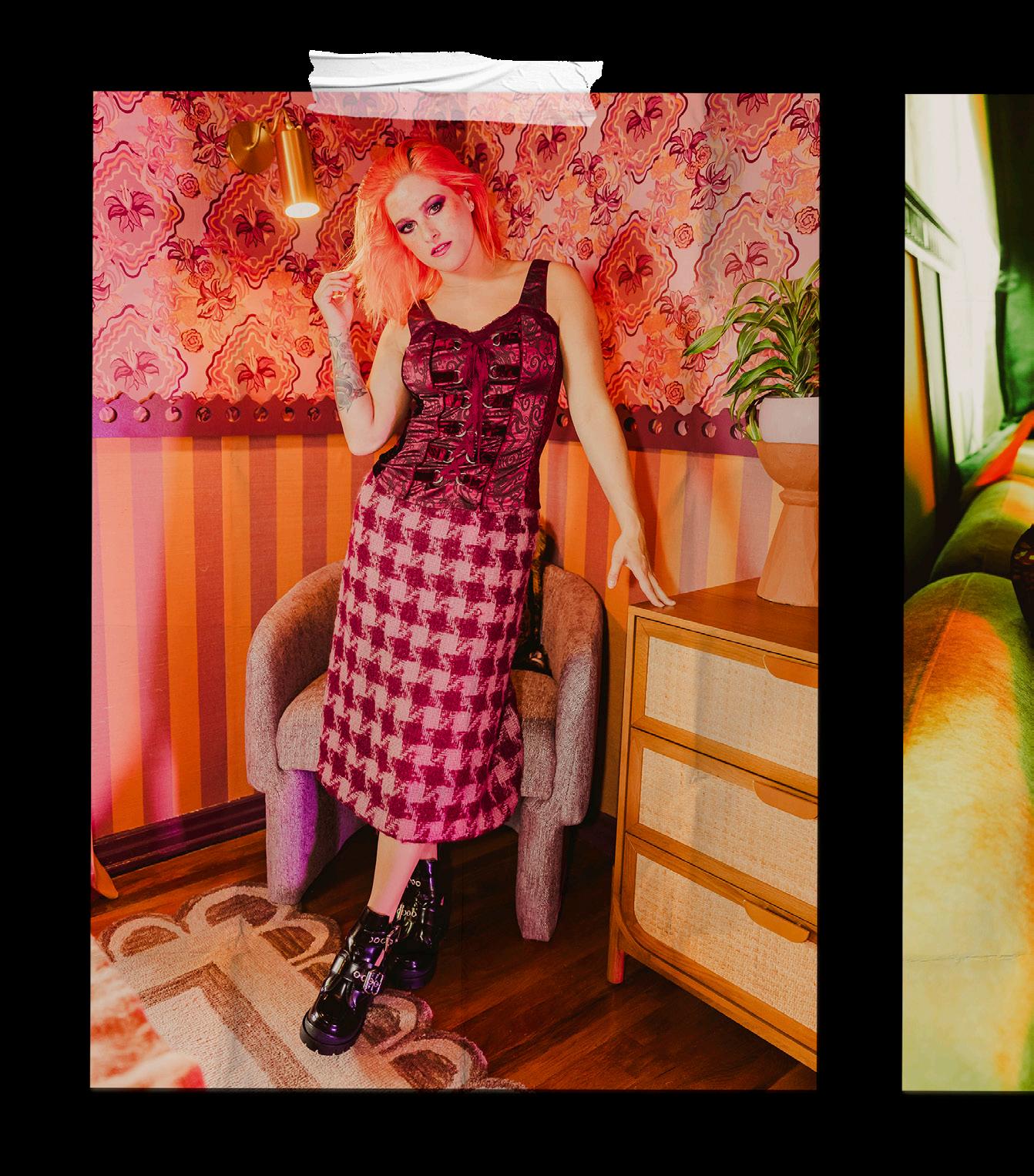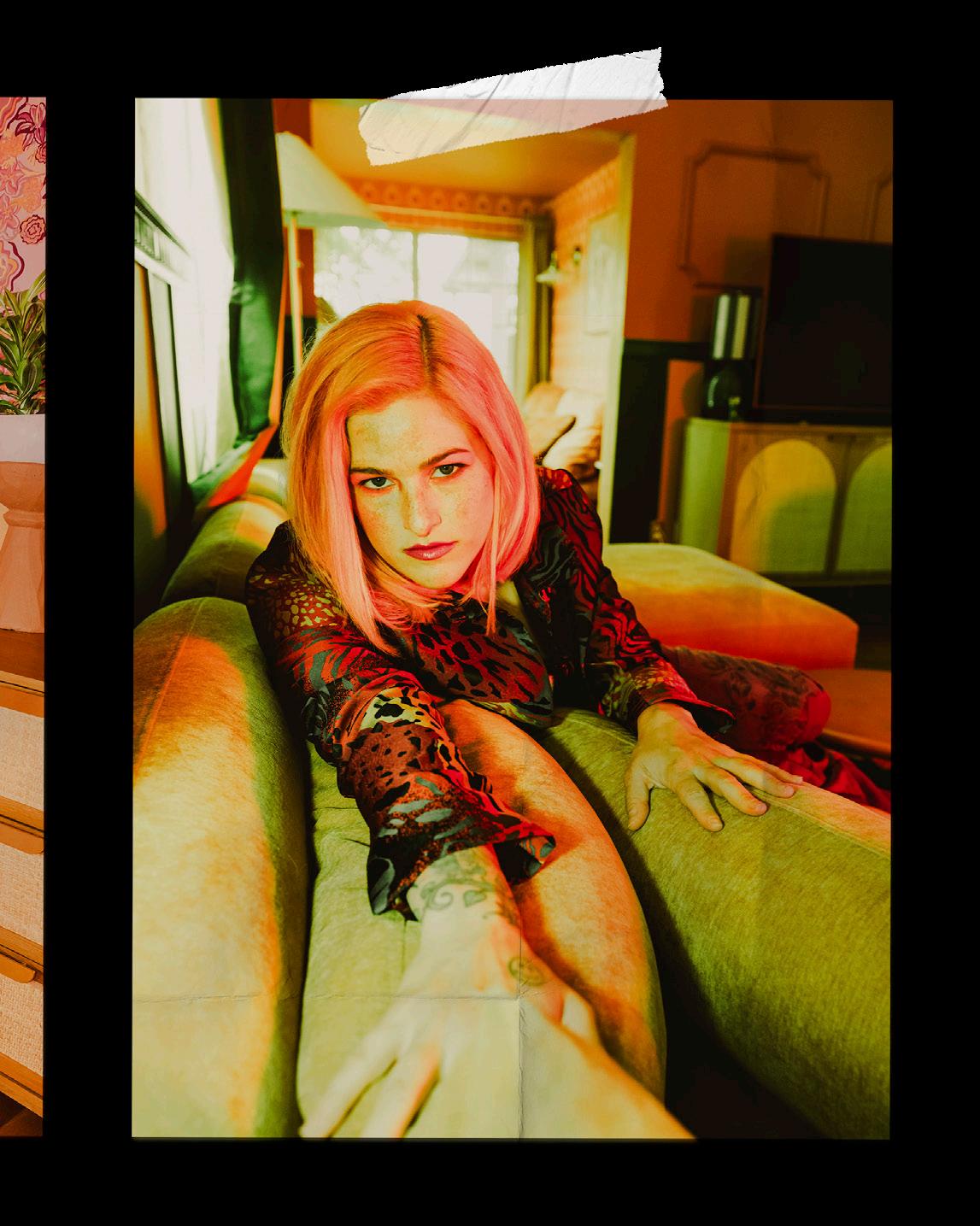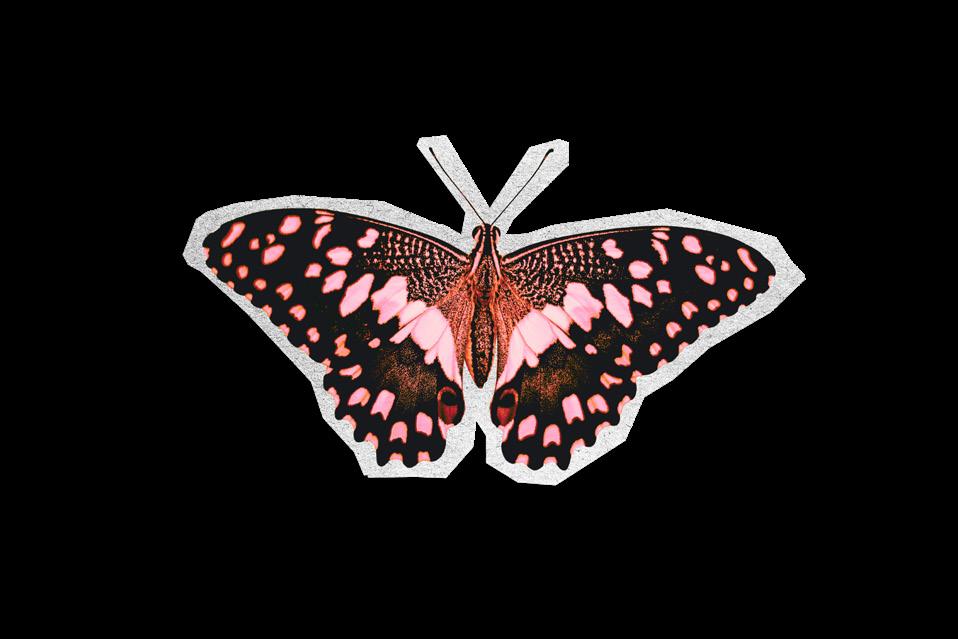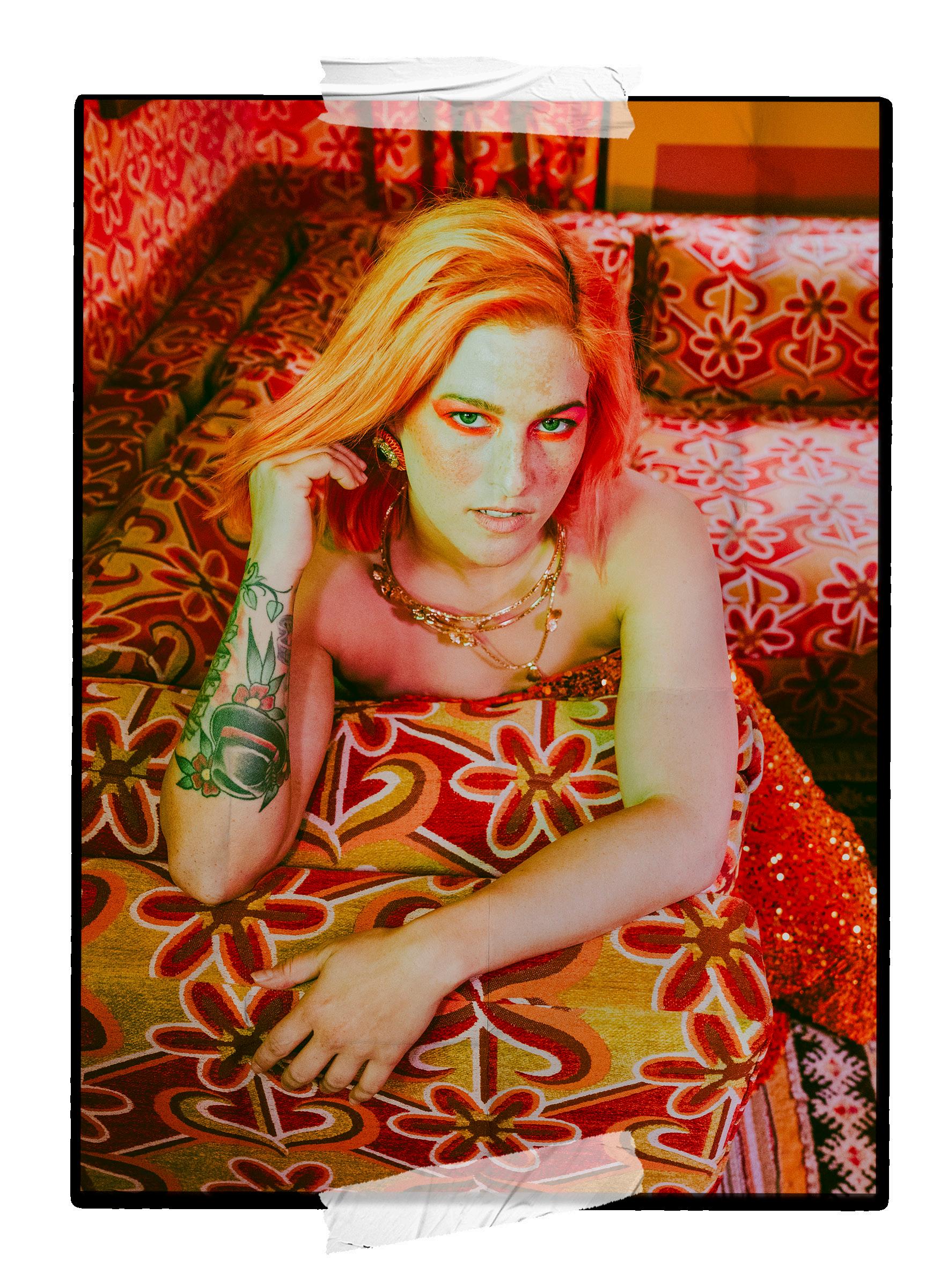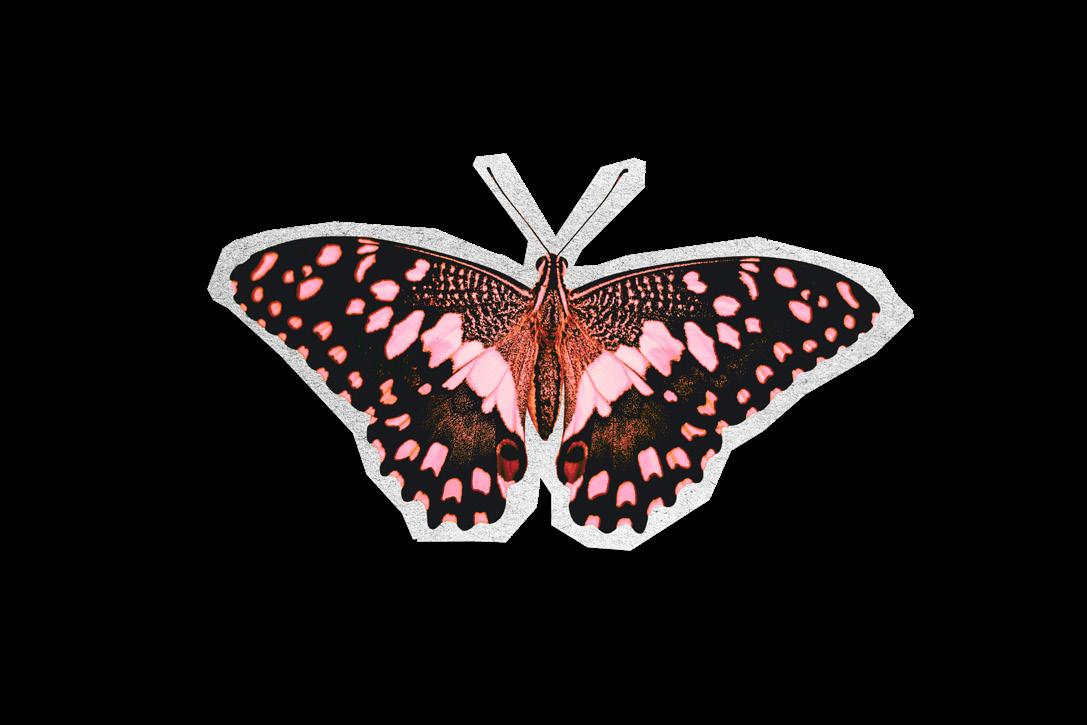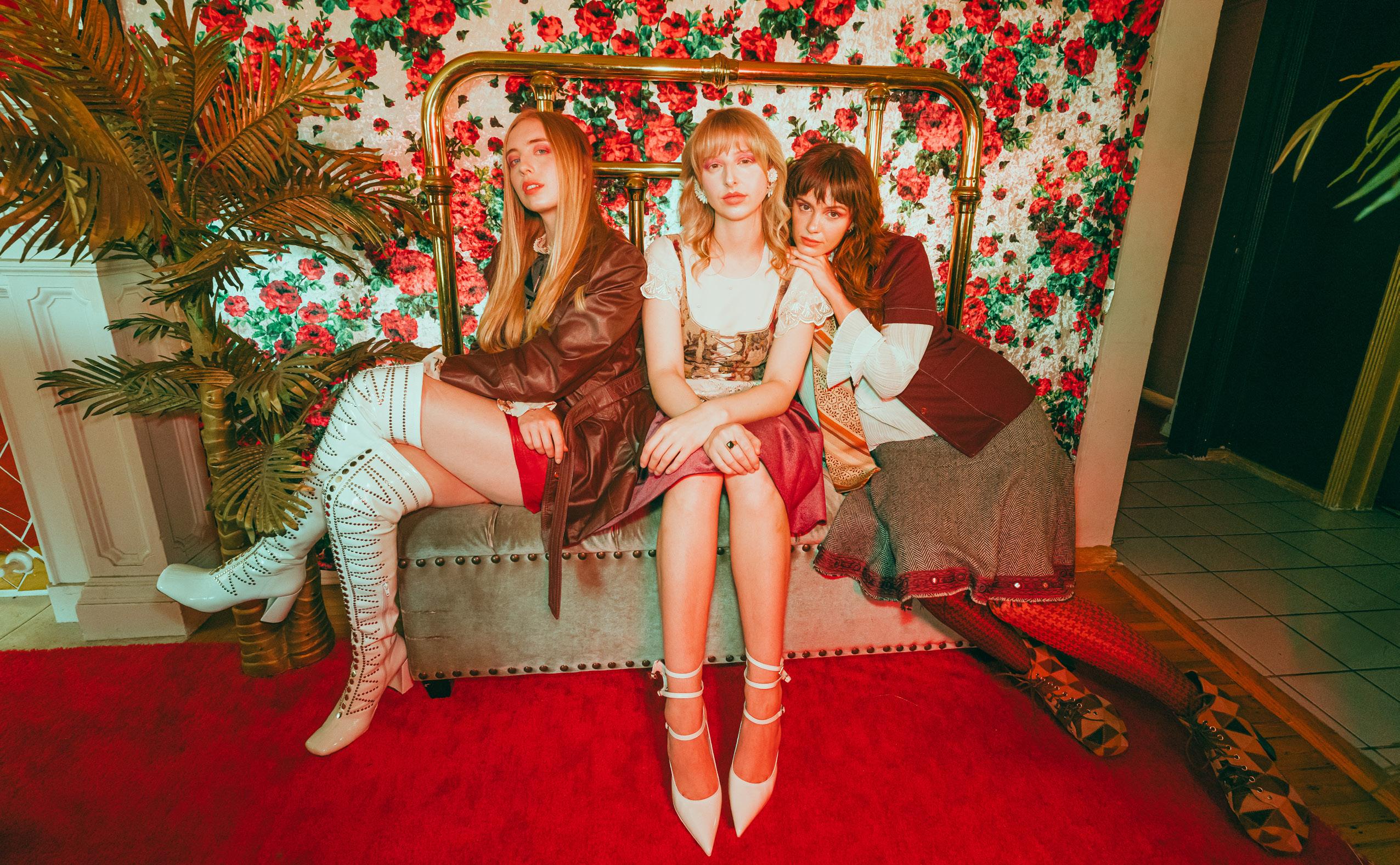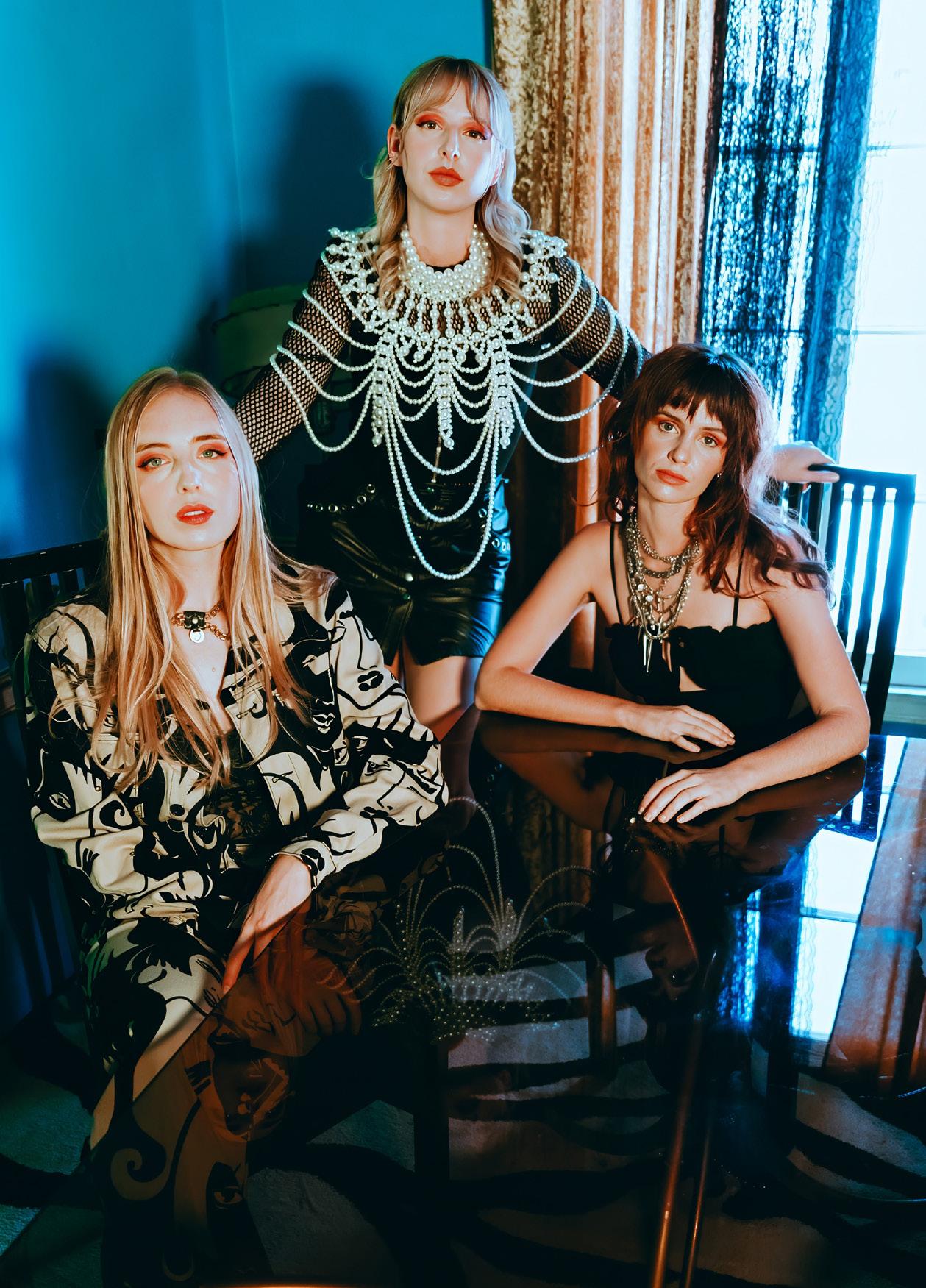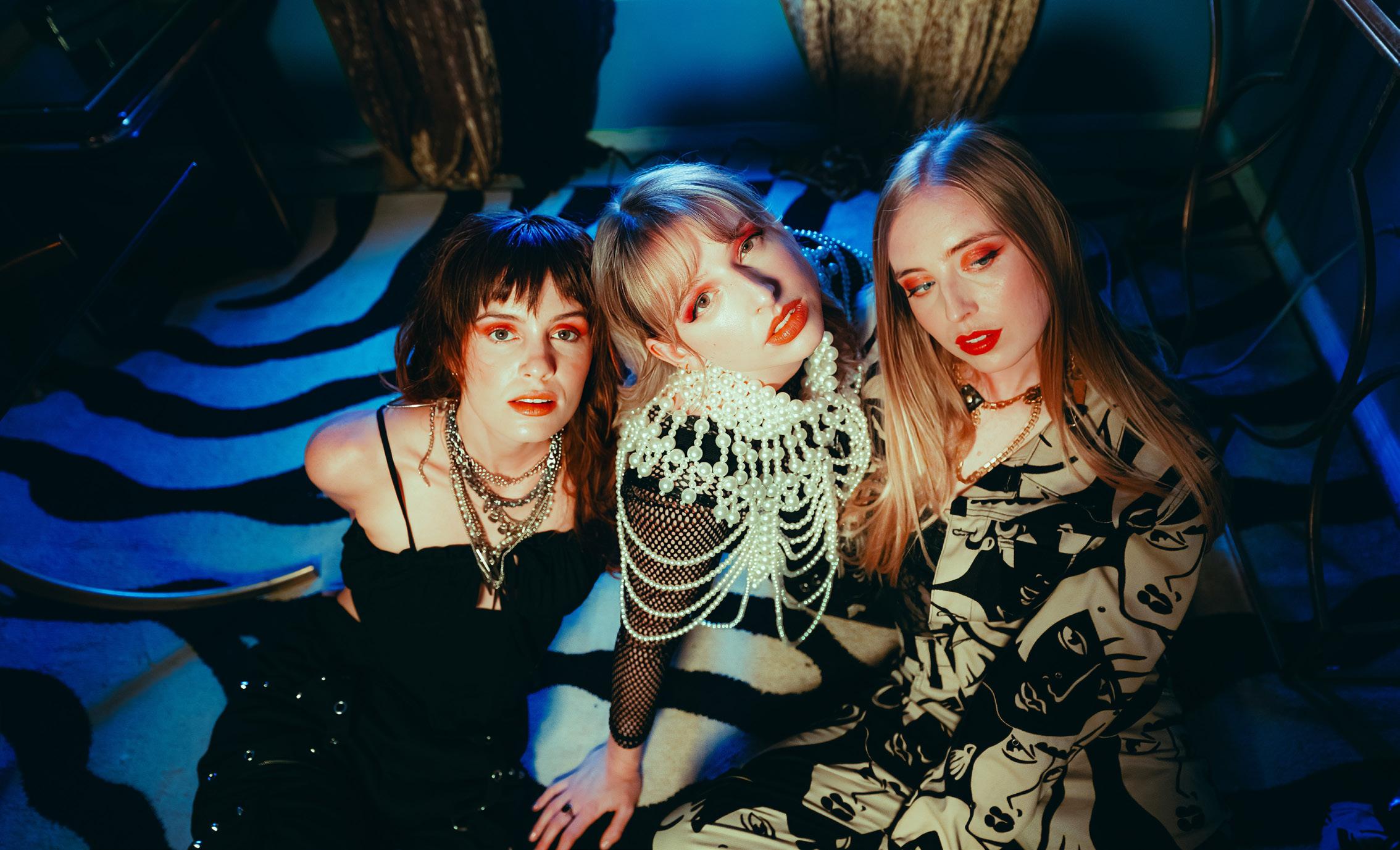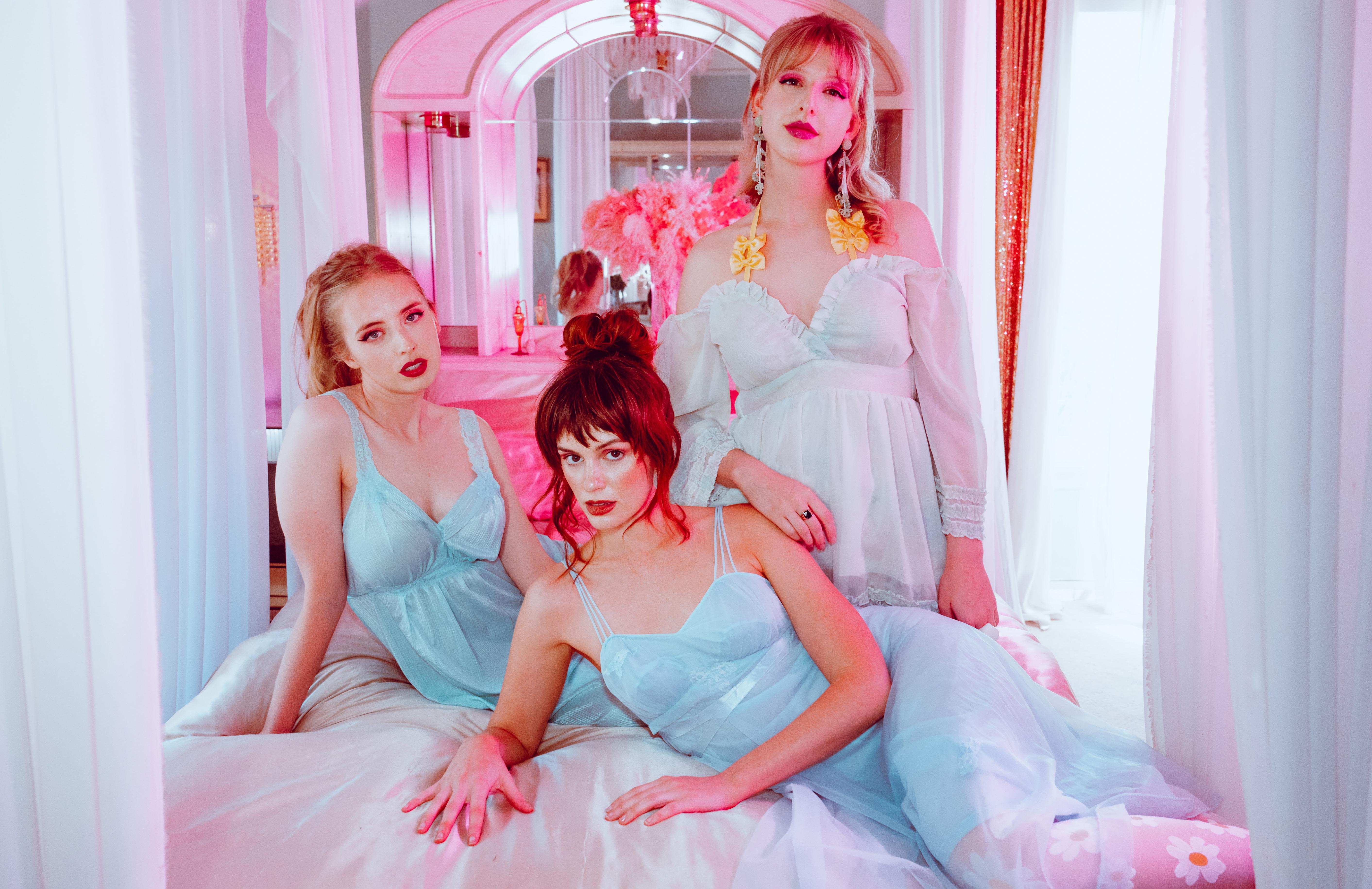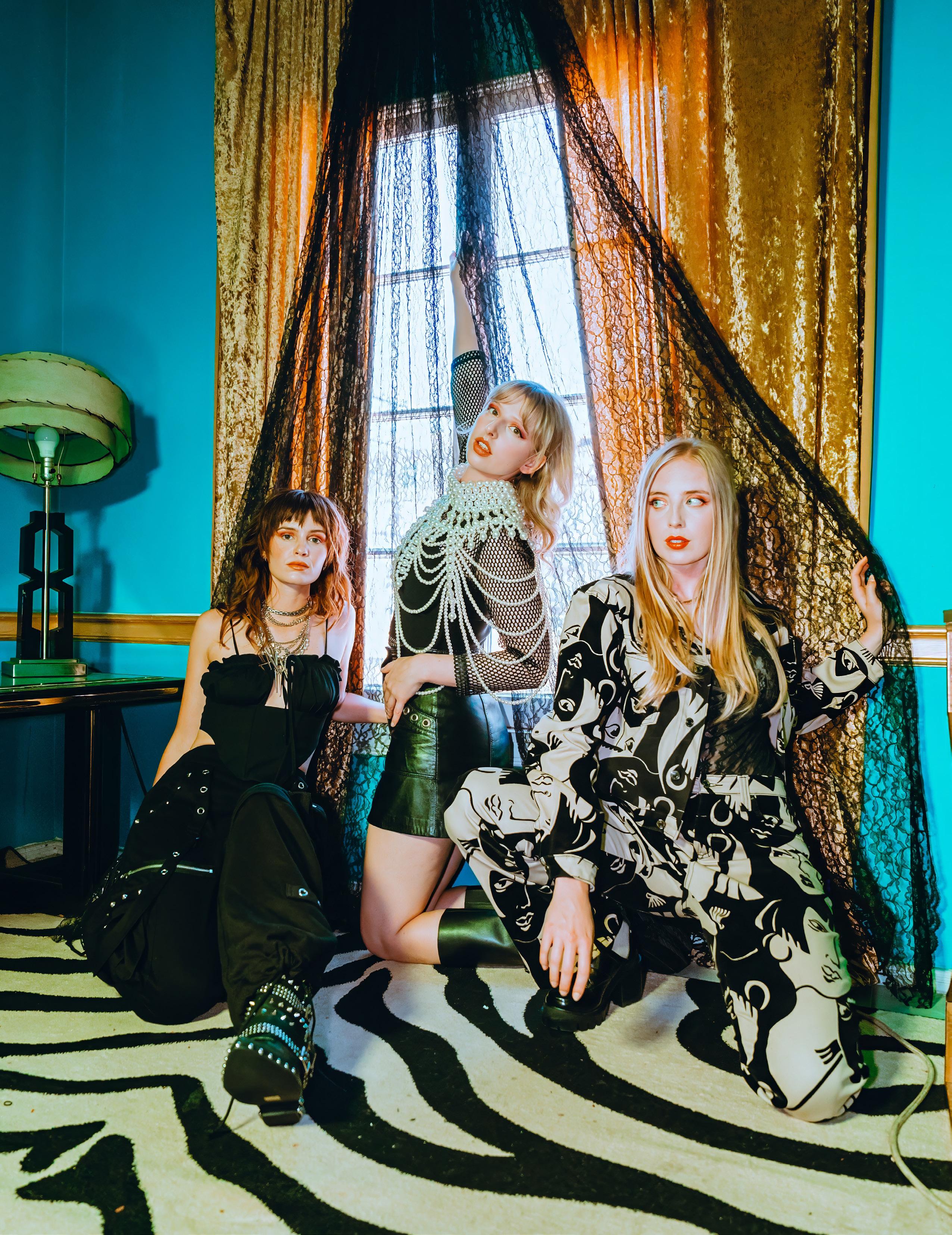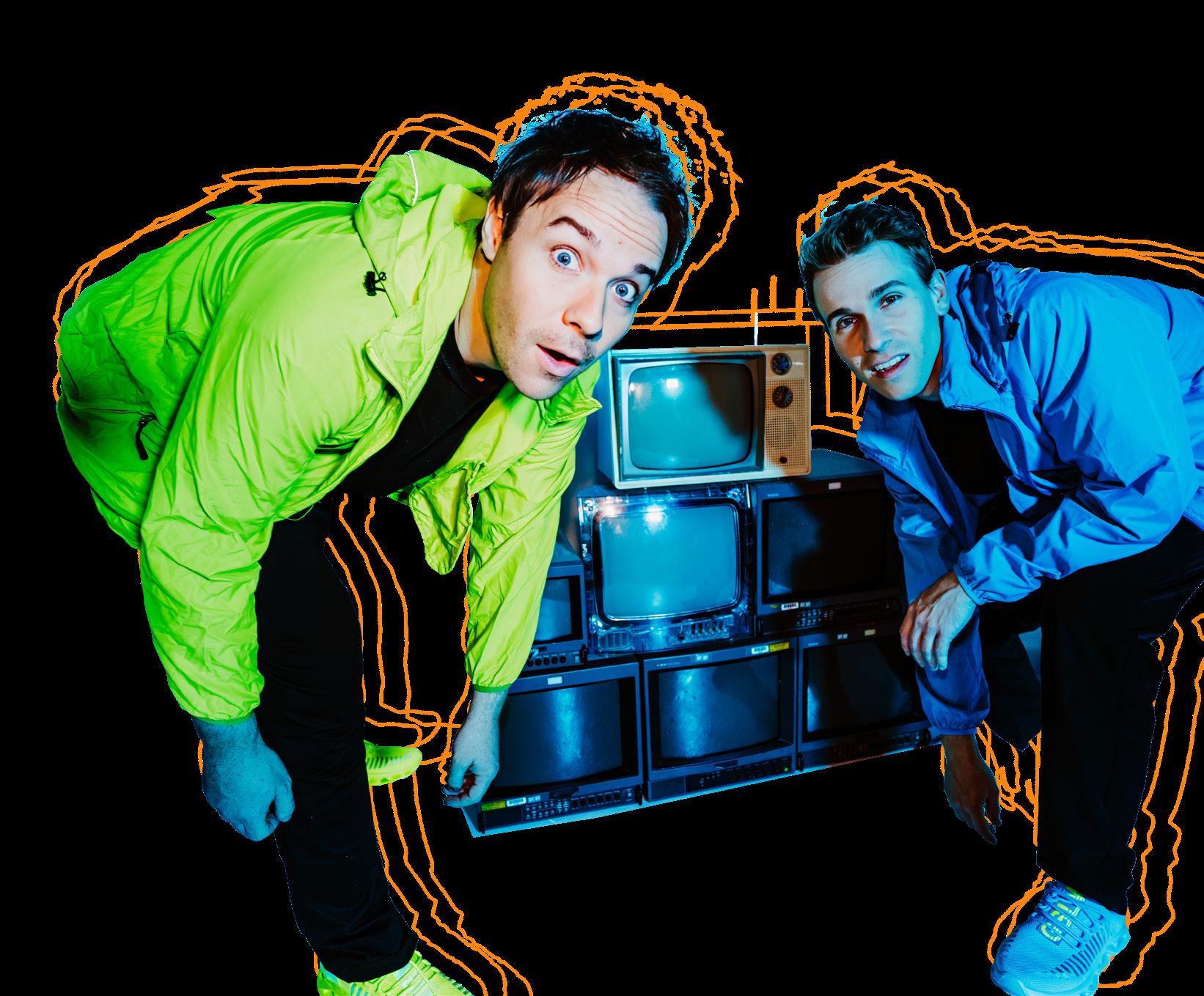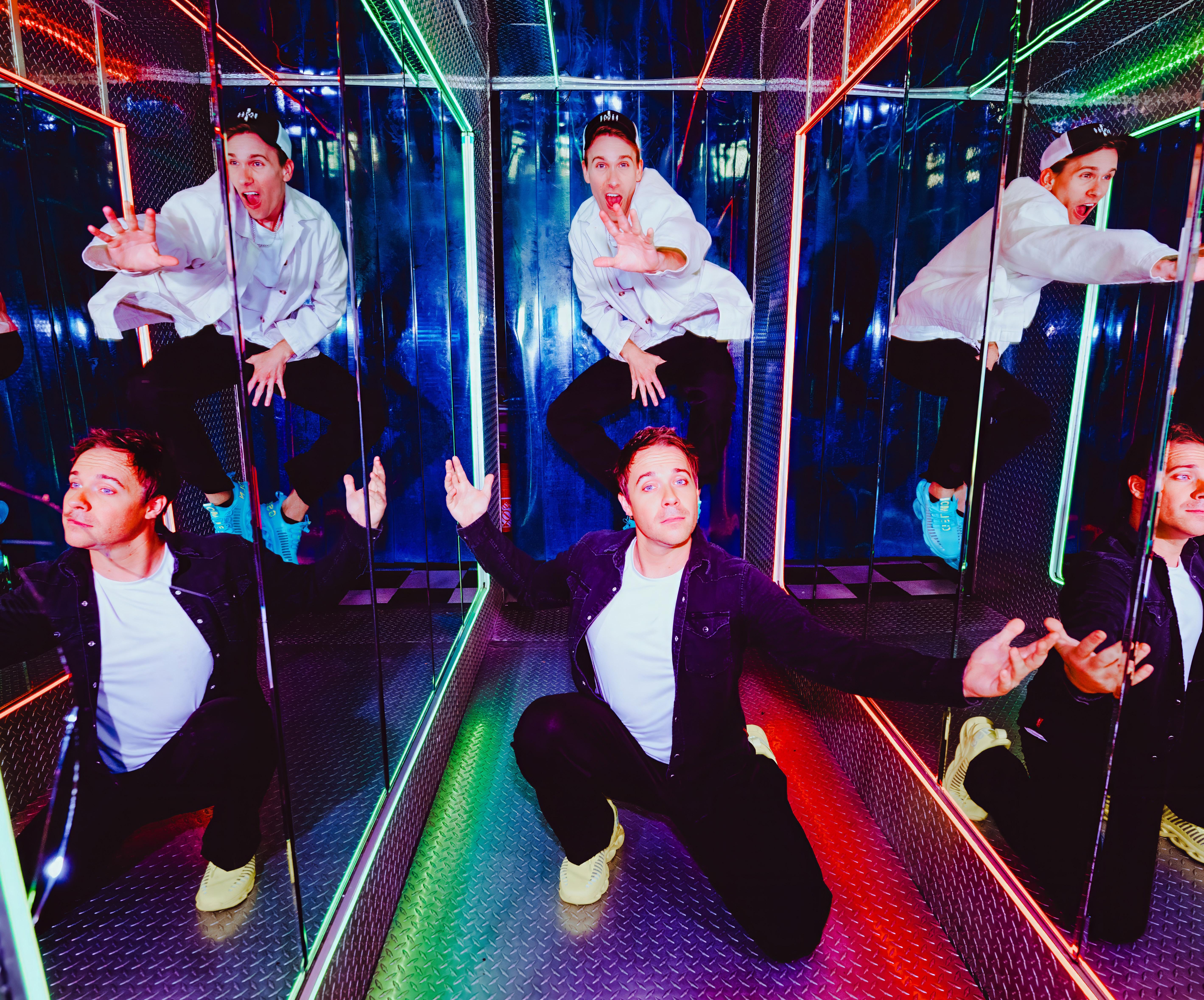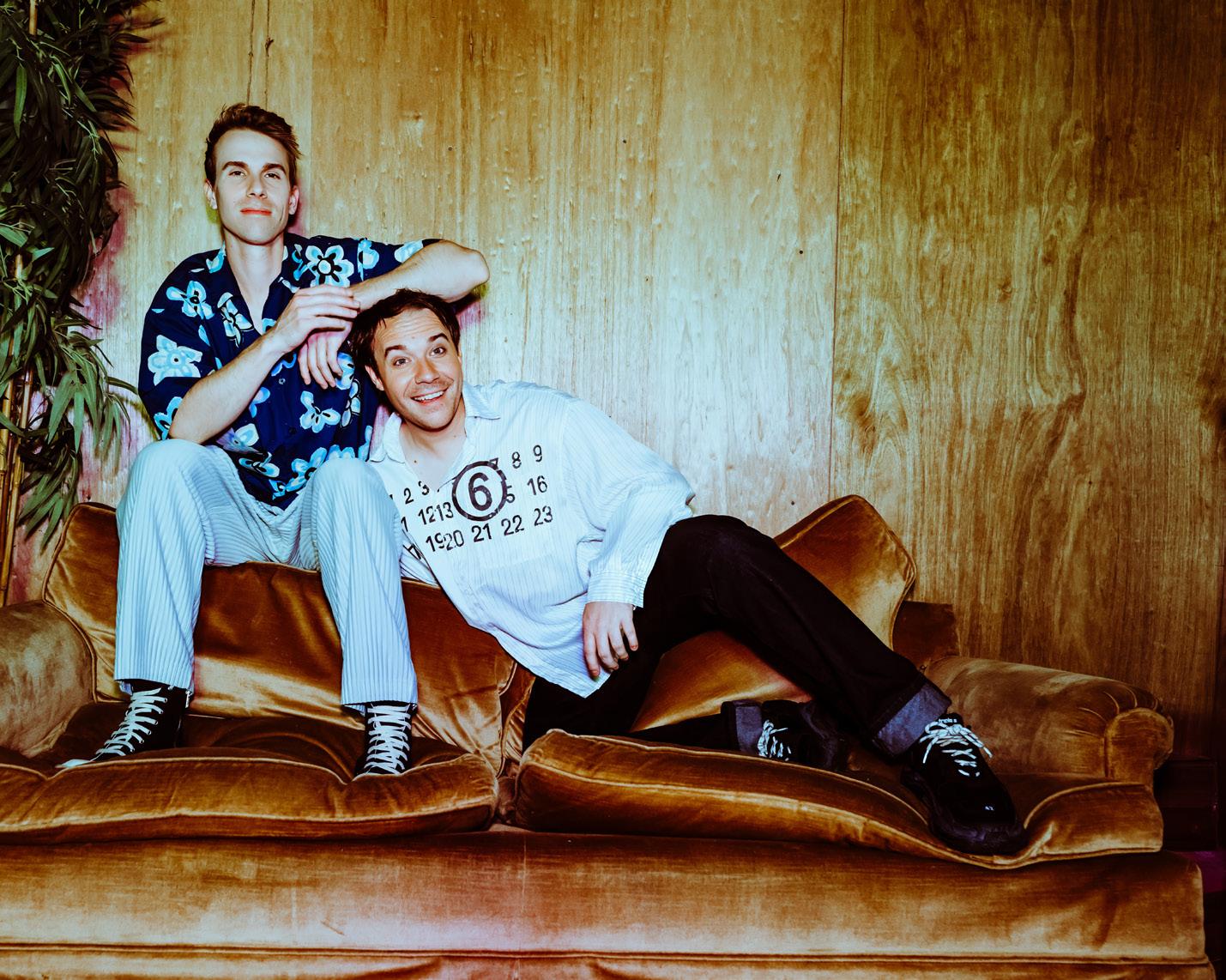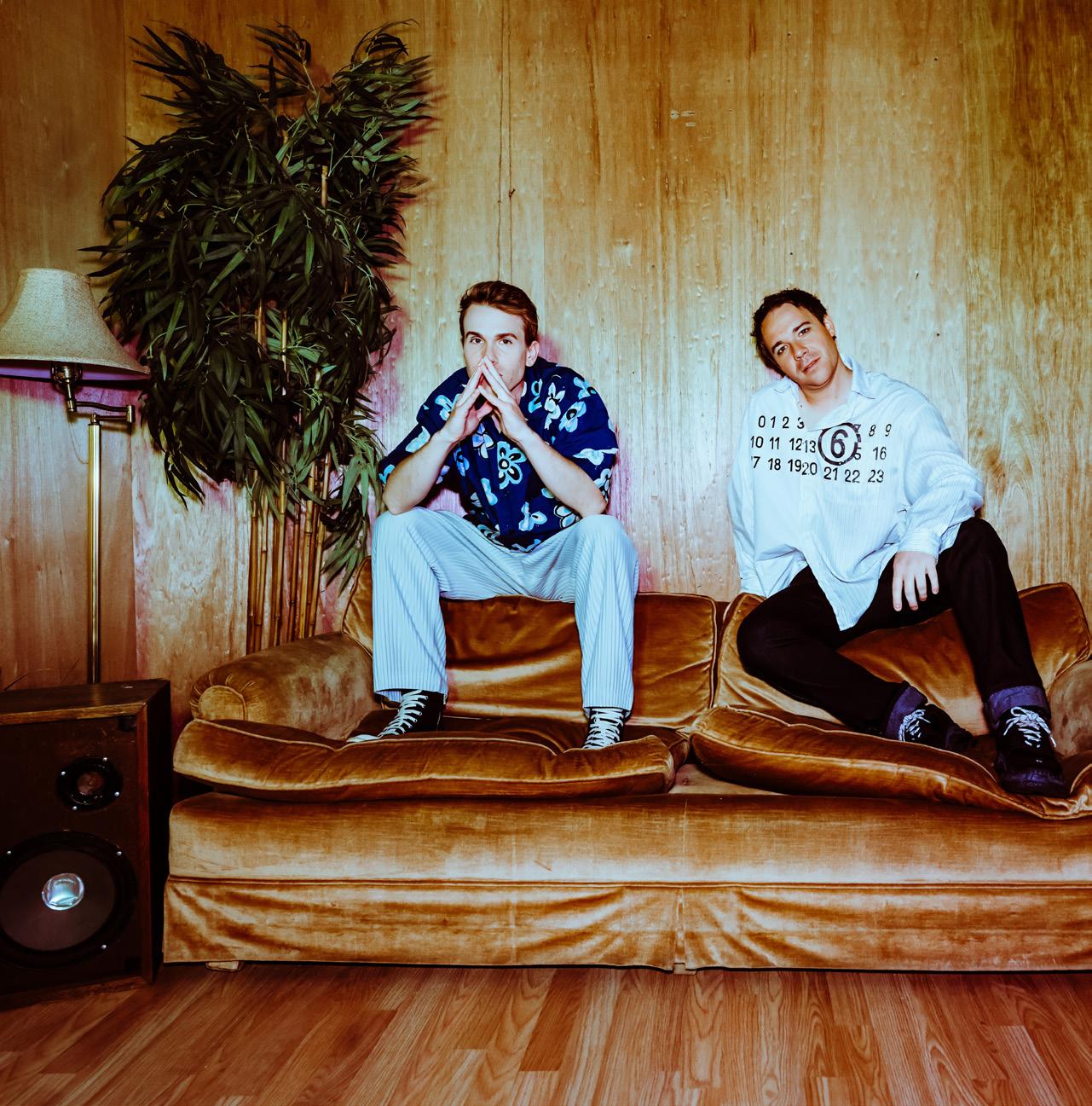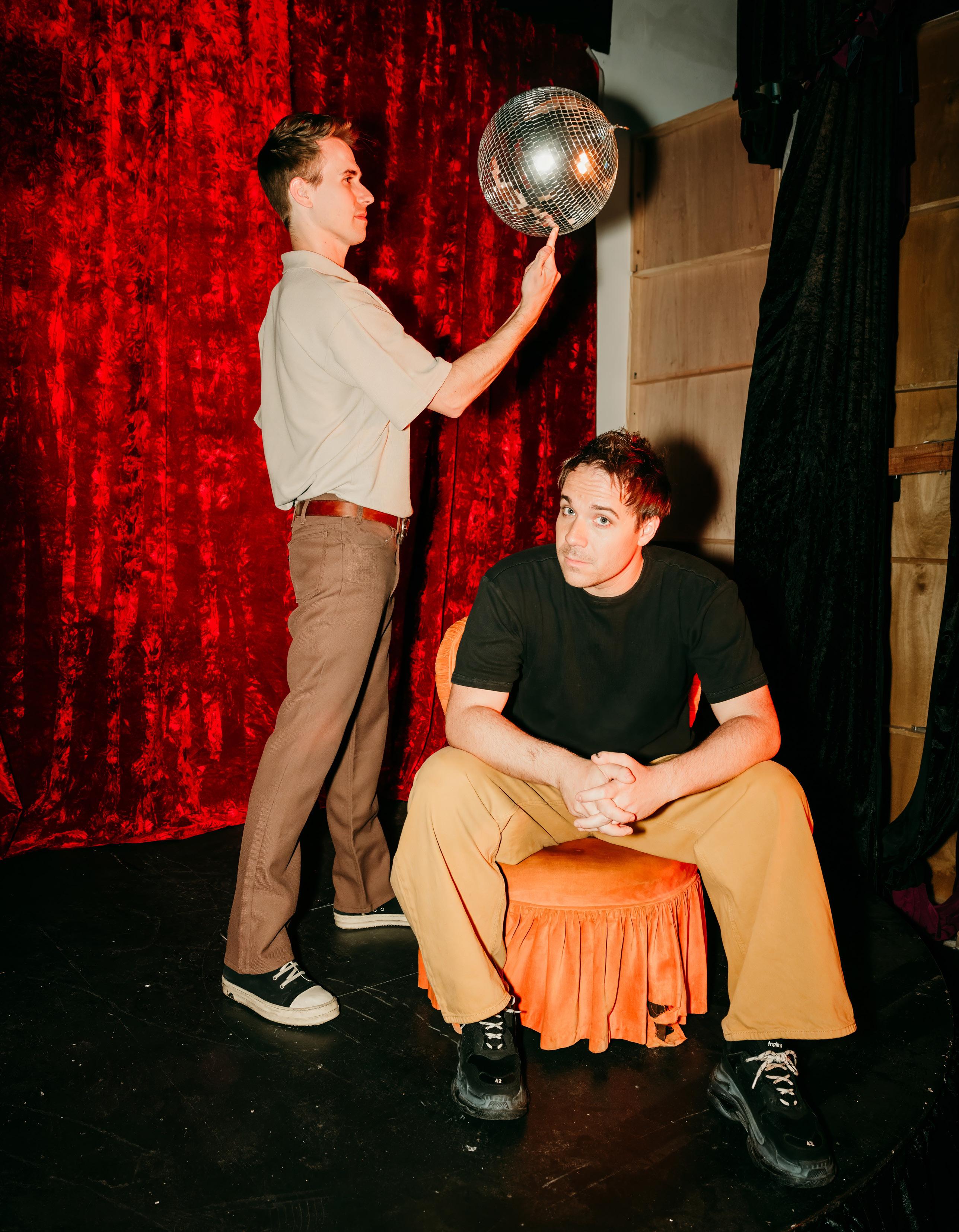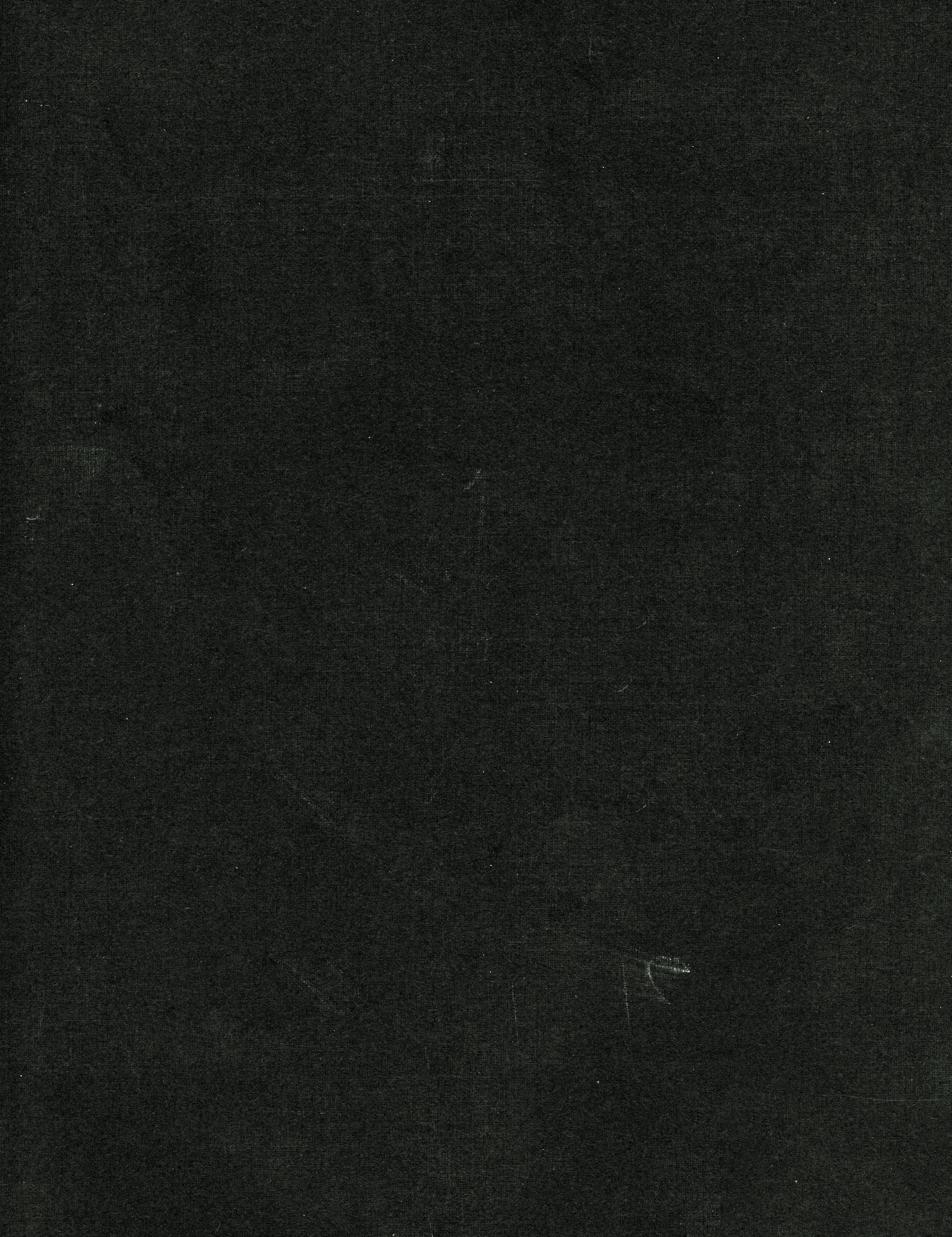EDITOR IN CHIEF: HEATHER KOEPP
LAYOUT DESIGN: ELISE COATES
BLACK GRYPH0N
Interview and Photos: Heather Koepp
Grooming: Mx. Monroe James
BLUSHER
Interview: Heather Koepp
Photographer and Wardrobe Styling: Heather Koepp
Key Hair and Makeup Artist: Mx. Monroe James
Hair and Makeup Assistant: Ariel Alvarez
Hair and Makeup Assistant: Jocelyn Sfetcu
CASSADEE POPE
Interview: Danielle Taylor
Photographer and Wardrobe Styling: Heather Koepp
Hair and Makeup: Mx. Monroe James
FENCER
Interview and Photos: Heather Koepp
NORTHBOUND
Interview and Photos: Heather Koepp
SO, WHERE ARE YOU GUYS FROM? AND HOW DID YOU MEET?
FIELD: We are from Los Angeles, California, for better or worse. I met Cameron in an old pop punk band that I joined on some band finder website. He was the drummer, and I joined as the bass player. Cameron and I were playing together for a bit, and we started writing independently because we weren’t thrilled with being in a pop-punk band. And so we started breaking off and doing our own thing. Eventually, we needed a bass player, so Cameron’s little brother Scott was filling in, and it came to a point where we were just like, ‘Let’s just do this,’ and that was early February of 2017
WHAT INSPIRED THE NAME FENCER? DOES IT HAVE A PARTICULAR MEANING OR STORY?
FIELD: We were trying to come up with a band name, but it seemed like every good name was already taken. We wanted a single-word name. My mom sent us pages of name ideas, and we went through a bunch of them. At one point, we were calling ourselves Birthday Shape.
CAMERON: There was some weird stuff. Gift Wrap was in there. Fiberglass for, like, two weeks.
FIELD: Yeah, and then we landed on Fencer. I used to fence a bit, but that wasn’t necessarily the reason. It just sounds good, and it looks good.
HOW WOULD YOU DESCRIBE YOUR MUSIC STYLE TO SOMEONE WHO’S NEVER HEARD IT BEFORE? AND WHAT SETS YOU GUYS APART FROM OTHER BANDS IN THE SCENE?
FIELD: We are a rock band. We could be called garage rock. We could be called Hard Rock. Pop Rock. I think our mentality is that we like catchy hooks at its core, so we like to be heavy, nasty, and aggressive. When you hear something that’s catchy, it makes your ears go, whew, and it feels nice, so we’d like to get as weird as we can. So, we write pop songs but through an angry lens.
WHAT HAS BEEN YOUR MOST MEMORABLE LIVE PERFORMANCE TO DATE?
CAMERON: For me, it would be the album release show we did when we released our first album last February. We put on a sold-out show at Molly Malone’s and played it with many of our friends. I think it’s the biggest show we’ve put on to date, and it’s also my favorite because we did it ourselves. We did some cool lighting and had a cool intro; we had a production behind it. And I mean, at the end of the day, we played it to 200 people who came from all over Los Angeles to watch us play live, and that means so much.
FIELD: Yeah, I can agree with that. It was a small room, but it was completely packed. It was just about us, our music, and our fans. That felt nice. Another memorable show was in Grand Rapids, Michigan, when we were touring with Badflower. This was the biggest crowd we had ever played for, and we ended up crowd-surfing in our underwear in front of a few thousand people.
HOW HAS THE SOUTHERN CALIFORNIA MUSIC SCENE INFLUENCED YOUR MUSIC AND CAREER?
FIELD: One thing we’ve found challenging is trying to fit into a specific scene here in LA. You know, you
have your punk scene, the indie stuff, surf rock, and the psychedelic stuff, and none of that has necessarily influenced us directly. Honestly, we felt like a bit of an outcast in many of these scenes. Our music touches on so many different genres, and it can be hard to appeal to one specific niche. We’re not angry and raw enough to be considered a punk band, but we’re way too heavy to be pop music.
CAMERON: The local music scene has helped increase our band’s visibility. I’ve noticed that the punk scene is now mainly centered in the valley, and we’ve had many early shows and interactions with bands in that area. Some of those bands, such as Sad Park, have gained a lot of attention and success. While their influence might not directly impact our songwriting, they have helped us gain more attention.
WHAT ARE SOME OF THE BIGGEST CHALLENGES YOU’VE FACED AS A BAND SO FAR?
CAMERON: The hardest thing for me is staying consistent with the changes in the music industry. The industry has changed many times in the seven to eight years we’ve been around. We’ve tried to play the streaming game, focused solely on gaining a fanbase through live shows, and had to keep up with the industry and adapt to the impact of COVID-19. TikTok is a huge platform, and staying current with new content is difficult.
FIELD: Learning to keep up with the current landscape took us forever. We were focused on being good at what we were doing for a long time, but now we understand the importance of learning and adapting. It took a lot of experience for us to reach this point, but now I feel we have a better grasp of it.
HOW DO THESE SONGS DIFFER FROM YOUR PREVIOUS WORK? DO YOU THINK YOUR SOUND HAS EVOLVED IN ANY WAY?
FIELD: I believe that over the years, as we’ve continued to write music, we’ve reached a point where we feel like we have a clear understanding of how to create a Fencer song. It’s a collaborative effort between the three of us, and it feels like we’ve developed a bit of a formula for it. As we move forward with our new material, we know it’s cliché to say it’s the best stuff we’ve ever made, but we genuinely feel that way. And, of course, we’re excited about it as well. I think a lot of it is us pushing our sound a little bit further by adding new elements and sounds that we haven’t experimented with before. It’s cool to feel like I can listen to our latest stuff and say, “Yeah, it’s heavier than we’ve been and poppier than we’ve been before.” I like both of those things. Those are cool aspects to me, and there’s just a lot of weird sound. As we’ve been messing with it, it feels like a more mature era.
YOU’VE ALL BEEN TEASING THE RELEASE OF SOME NEW SONGS. CAN WE EXPECT A NEW FENCER ALBUM SOON?
FIELD: We will be releasing a new single every six weeks until January when the first EP will be released. The album will be released in two separate sections. Although this may sound far away, there will be consistent music released, so it’s actually not that far off.
HOW DO YOU PLAN TO EXPAND YOUR FAN BASE? YOUR SOCIAL MEDIA HAS BEEN MORE ACTIVE WITH CONSISTENT POSTING OF NEW CONTENT. DO YOU INTEND TO USE THESE PLATFORMS MORE TO PROMOTE YOUR MUSIC?
FIELD: We plan to post daily short-form content that we’ve been filming for a long time. The content will focus on promoting our first single, “She Burns Trees.” We intend to continue this pattern as we have been working on creating a large amount of content for our upcoming album or EP. We are committed to posting highquality content daily across various platforms such as TikTok, Reels, YouTube Shorts, and Facebook. If you haven’t seen it, you should check out the latest post – it’s cool!
CAMERON: I think the main takeaway is that we need to strike a balance between pushing boundaries and maintaining a level of authenticity in our sound while also trying to find our place in the commercial/mainstream space. Our new songs achieve this balance well - catchy and edgy without being too chaotic. I believe the new material is well-balanced.
FIELD: Having said all of that, the new material has a distinct Fencer sound. By listening to any of it, you’ll recognize our brand and hopefully appreciate the different directions we take in each song.
DID YOU GUYS EXPERIMENT WITH NEW INSTRUMENTS OR INCORPORATE NEW TECHNIQUES DURING THE RECORDING PROCESS?
SCOTT: Yes, we focused a lot on percussion for this song. We used a washboard for the first time. There was another instrument called a Vibraslap that I couldn’t remember the name of during the whole recording process, so I just called it a cow jaw because the producer, Greg, said that’s what they used to make it out of.
FIELD: We had a multi-cowbell that we used for a few things. Percussion, I would say, is the main element; however, there is one single coming out in the next few months that sounds radically different from anything else we’ve ever put out before. It has a tremendous amount of instruments and sounds that have no business being a Fencer record; we have omni chords and, violins and synths and pianos and 808’s, and all sorts of random elements.
SCOTT: Don’t forget about the kazoos.
FIELD: Oh, yeah, wait, I totally forgot this, “She Burns Trees” has a massive kazoo solo at the end. They have a kazoo pickup you can buy online that you shove into the top of a kazoo, and it plugs into an amp, so I ran it through my pedal board and started playing this kazoo through crazy fuzzes and octave pedals, which resulted in this long, drawn-out, big band-like solo.
ARE THERE ANY NEW SONGS YOU’RE PARTICULARLY EXCITED TO PERFORM, OR DO YOU HAVE ANY FAVORITES?
CAMERON: I really like the song “She Burns Trees.” It’s fun to play, really catchy, and pushes the boundaries of what can be considered mainstream and insanity. I also enjoy the song “SUV”. I think it’s very similar to “Velvet Jetski,” not because they sound the same, but because they’re both kind of joke songs.
“SUV” was written about seven years ago at 4 am in Field’s Kia Soul outside my house and it ended up being a pretty catchy song. It’s a joke song with all these funny elements we thought of putting in there, and it turned out to be a pretty catchy song.
FIELD: Our first single, “She Burns Trees,” is set to be released on July 26th. The song conveys the feelings of being strung along and made to feel like a backup option by someone and the emotional impact it entails. It’s a high-energy song with some nasty riffs and some very cool sounds.
DO YOU HAVE ANY LIVE SHOWS COMING UP TO SUPPORT THESE UPCOMING RELEASES?
FIELD: July 26th will be our single release show at Harvard and Stone. We’ll also be performing at The Roxy for the first time on August 30th. We’ve somehow never played the Roxy, despite opportunities in the past but now feels like the right.
NORTHBOUND
In an era where pop punk is experiencing a revival, Northbound’s music stands as a nostalgic beacon, echoing the mid-2000s sound that shaped his formative years. In this engaging interview with RIVAL, Northbound delves into his musical journey, from his debut in 2012 to his latest fourth album, Juniper, released on July 12th. At 30, he reflects on the influences that have molded his music and shares insights into his lyrical inspirations, drawn from everyday life and the philosophy of writers like Bukowski. His dedication to his craft, evident in his commitment to maintaining an online presence while staying authentic to his roots, is truly inspiring. This conversation offers a glimpse into the mind of an artist dedicated to his craft and resonating with a sound that continues to captivate listeners.
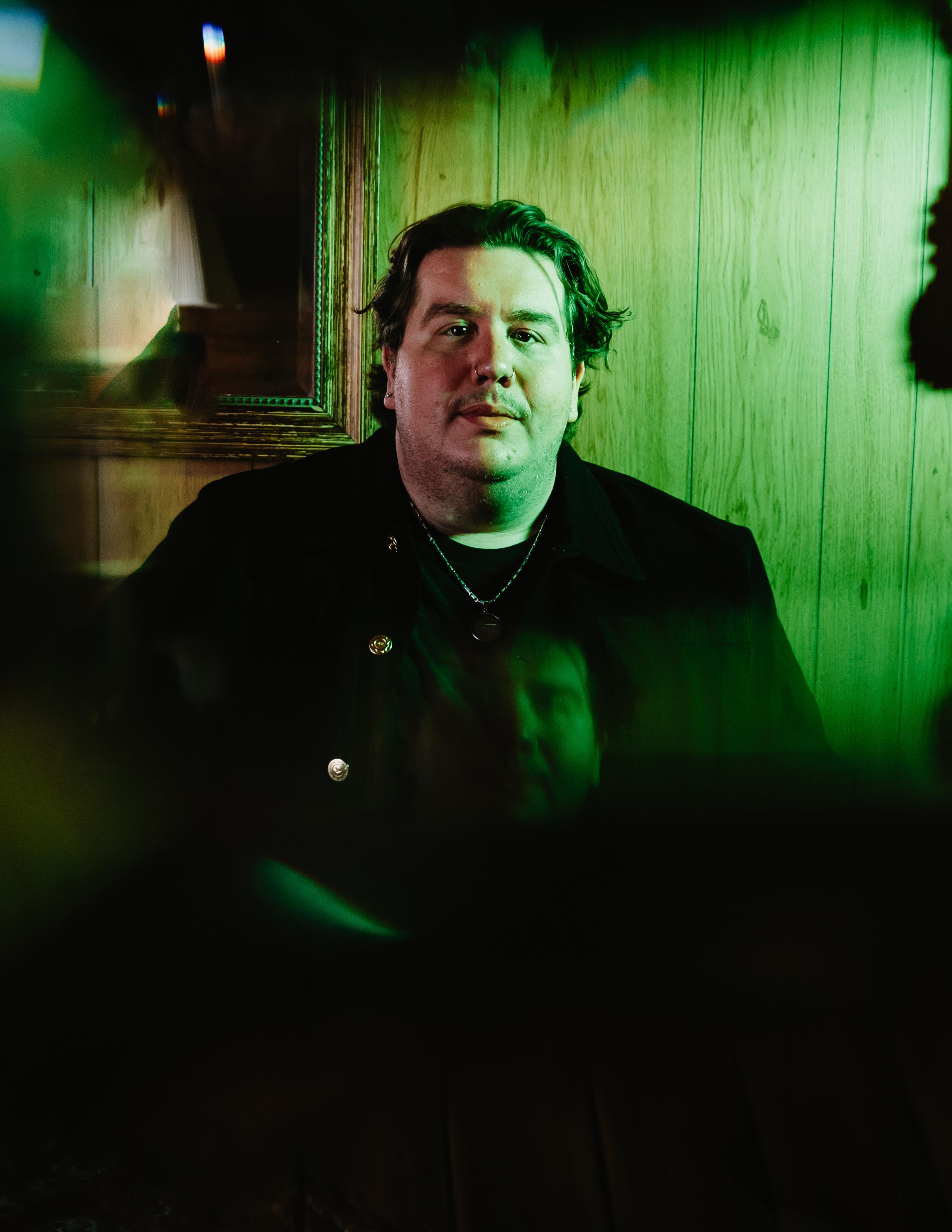


SO, HOW DID YOU GET STARTED IN MUSIC? It started really, really young. I remember being at my second birthday party; well, I don’t remember it, but I have a home video of it, where I had this little inflatable guitar that I would play with all the time. My mom always says that that’s when she knew I would be a musician. I got my first guitar when I was around eight years old.
YOUR MOM SOUNDS REALLY SPECIAL TO BE ABLE TO RECOGNIZE AND ENCOURAGE YOUR TALENT AND YOUR PATH SO EARLY. Yeah, my mom rocks; she’s really the best.
ARE THERE ANY NON-MUSICAL INFLUENCES FROM WHICH YOU DRAW INSPIRATION, SUCH AS AUTHORS, FILMS, OR BOOKS? I like anything created by Charles Bukowski. I think he is fantastic, and I’ve been really into his stuff, especially since I moved to LA. Los Angeles feels like a character in all of his books and poems.
DO YOU WRITE ALL YOUR SONGS YOURSELF? OR DO YOU COLLABORATE WITH OTHER SONGWRITERS? I write all the songs. I would say I take everything to the 85% mark, and then that final 15% is my buddy Andy, who plays guitar with me, and Sam, who’s produced the last couple of records. I run everything through those two people. But the writing itself is something I do alone.
HOW MANY SONGS WOULD YOU SAY THAT YOU WRITE BEFORE THEY GET CHOSEN FOR THE FINAL ALBUM? I think every album has about 20 to 30 songs, and I pick my favorite ten from that.
DO YOU THINK YOU’LL EVER DO A ‘B-SIDE’ ALBUM?
Maybe I do have many songs that will probably never see the light of day, but I have thought about that.
DID YOU EXPERIMENT WITH NEW TECHNIQUES OR INSTRUMENTS WHILE RECORDING THIS ALBUM? Nope, this is straight guitar music.
YOUR MUSIC IS VERY NOSTALGIC TO THAT MID-2000S ERA OF POP PUNK, WHICH HAS MADE A SIGNIFICANT COMEBACK IN THE PAST COUPLE OF YEARS. That’s exactly what I’m going for, and I think that’s what I’ve always been going for. I make the stuff I like and what sounds like the music I listened to in my formative years and still listen to today.
SO THIS WILL BE YOUR FOURTH ALBUM, CORRECT? WHEN DID YOUR FIRST RECORD COME OUT? Yes, it’s the fourth album. The first album was released in 2012.
AT 30, HOW DO YOU KEEP YOUR SKIN LOOKING SO GOOD? HAHA Dude, my skin regimen is literally this; I went to Ulta, I told one of the employees that I’m a dumb man, help me. So, she sorted me out with some basic skincare products that I don’t even use that much.
DO YOU EVER FEEL PRESSURE TO CONFORM TO CREATING MUSIC THAT OTHER PEOPLE WANT VERSUS WHAT YOU WANT? I think it’s always in the back of my head if people will like it, but honestly, it’s not that important to me. I don’t find it hard with the music; I’m going to make what I make, and when it comes out, I hope people will like it. I’m just trying to make a good product that represents me. But outside feedback means almost nothing when I am in the creative process. Once the music is released, at that point, I start to care and get curious about how the listener perceives it.
BEING DIRECT ABOUT YOUR BRAND IS IMPORTANT, AND I APPRECIATE THAT YOU’VE STAYED AUTHENTIC ABOUT WHAT’S IMPORTANT TO YOU. I have struggled with that my whole life as I never want to come off as rude, so it took some time to find the balance.
SAYING NO IS DIFFICULT FOR A LOT OF US. I STRUGGLE TO SAY NO OFTEN, AND THEN SUDDENLY, I’M DROWNING IN COMMITMENTS. I’m a classic over-committer because I don’t want to disappoint people, but then I end up disappointing people in the long run because I can’t keep up.
ARE THERE ANY CHALLENGES YOU FACE WITH MAINTAINING AN ONLINE PRESENCE? Yes, I maintain only challenges, haha. It’s hard, but I have to do it. If you see my social media, you can get an idea of what I’m about and all that, and that’s important. But yeah, I don’t particularly like it. I think the internet is fun, and I like to be on it, but sometimes you’re just having an off day and don’t want to be seen or whatnot, but the algorithm does not care. And neither do people in the music industry who are like, ‘Oh, this is the way things are now.’ And I agree, it’s the way things are now, but it’s definitely a struggle.
SOMETIMES, RECORDING YOURSELF IN A QUIET ROOM CAN FEEL RIDICULOUS. That’s how I feel too. I have to stop myself often from not making fun of what I’m doing. Like yesterday, I posted this video of me lip-synching to one of my songs that’s coming out. I posted it to my story and captioned it like, ‘Oh, do you guys remember when I was 30 years old, and I was lip-synching in my room’, you know? But then I deleted it because I don’t want people to think I’m making fun of other creators.
NO, IT’S RELATABLE. SO MANY ARTISTS HATE THAT THEY MUST BE CONTENT CREATORS WHEN THEY JUST WANT TO BE TRUE TO THEIR SPECIFIC CRAFT. NOT EVERYONE WANTS TO SHARE THEIR OPINIONS AND LIFE UPDATES EVERY DAY. People tend to put you into this position of needing a voice on trending topics, especially when you’re an artist. I don’t want to have a public opinion on politics or social things like that. I’m just an artist, and I don’t feel I’m able to give out major life advice.
I CAN RESPECT THAT. WHAT WOULD YOU SAY IS THE BEST ADVICE YOU’VE EVER RECEIVED? The first thing that comes to mind is I remember being a kid, probably 14 or 15, and I really wanted to play shows but was horrifyingly shy. I remember vividly crying to my mom about how I needed to be a musician and this desire to perform. To some, it may sound harsh, but it’s something that’s stuck with me to this day; she was like, ‘Well, don’t cry at me if you’re not even willing to try. If you try and fail, then cry to me, but don’t cry before you even give yourself a chance.’
WHEN YOU HAVE BIG GOALS AND BIG DREAMS, THERE WILL ALWAYS BE PEOPLE WHO WANT TO TELL YOU IT’S IMPOSSIBLE AND THAT YOU’LL NEVER SUCCEED. THAT SELF-DOUBT CREEPS IN, AND SUDDENLY YOU HAVE IMPOSTER SYNDROME. Yeah, no, absolutely. I had it and still have it sometimes, but I always think of that ‘until I have proof that I can’t do it, I’m going to do it.’ You know what I mean?
WHAT KEEPS YOU INSPIRED AND PASSIONATE ABOUT MAKING MUSIC? Life keeps happening, plus this is the only thing I’m good at. I have to keep doing it.
ARE THERE ANY PERSONAL MODELS OR PHILOSOPHIES THAT YOU LIVE BY? I think it’s back to the Bukowski thing of, ‘Don’t try to do it. Just do it.’ I’m always curious to learn about different topics, and I found it interesting when I read the Satanic Bible; there’s the mindset of ‘live an indulgent life and do whatever makes you happy, and do whatever you want to do as long as you’re not hurting other people.’ So there’s power in knowing that I’m not going to hold myself back from doing what I want to do in this short amount of time on Earth. I will do my best not to hurt anyone along the way, but this is my only life, and I have dreams to chase.
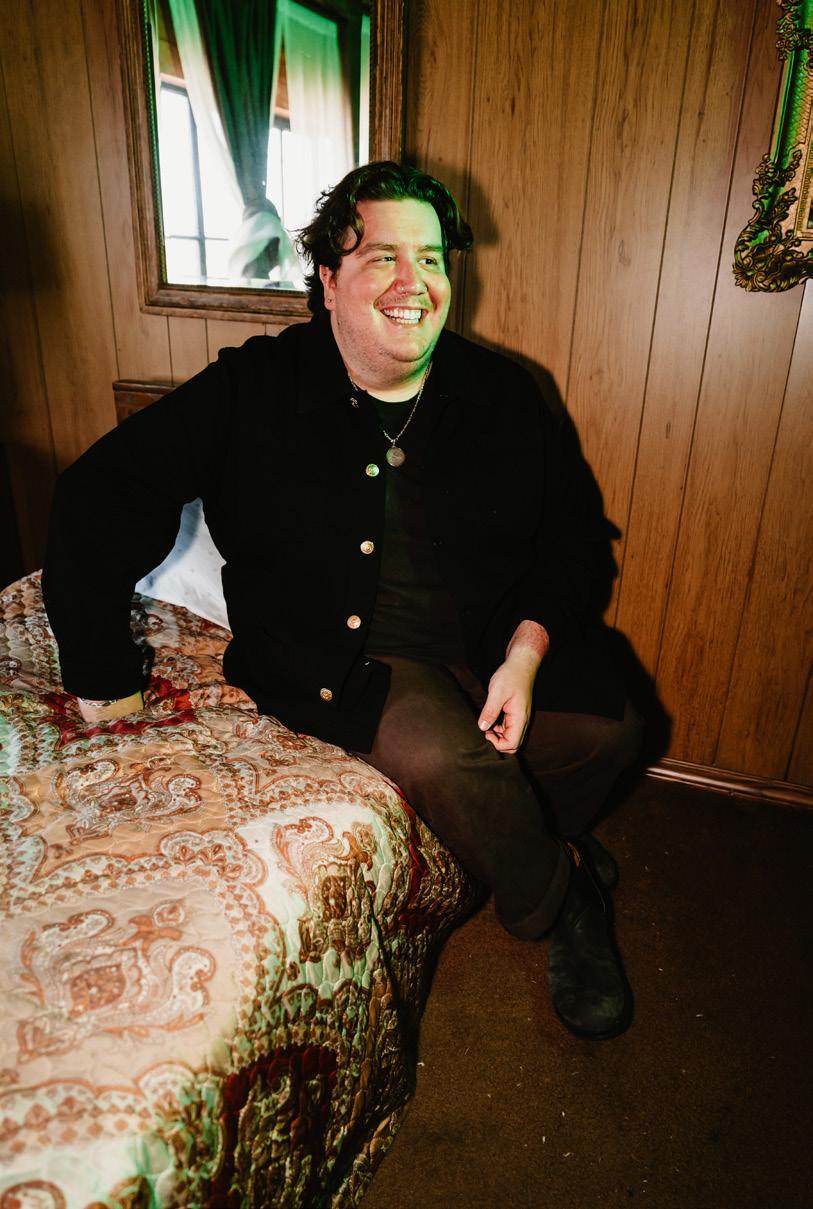



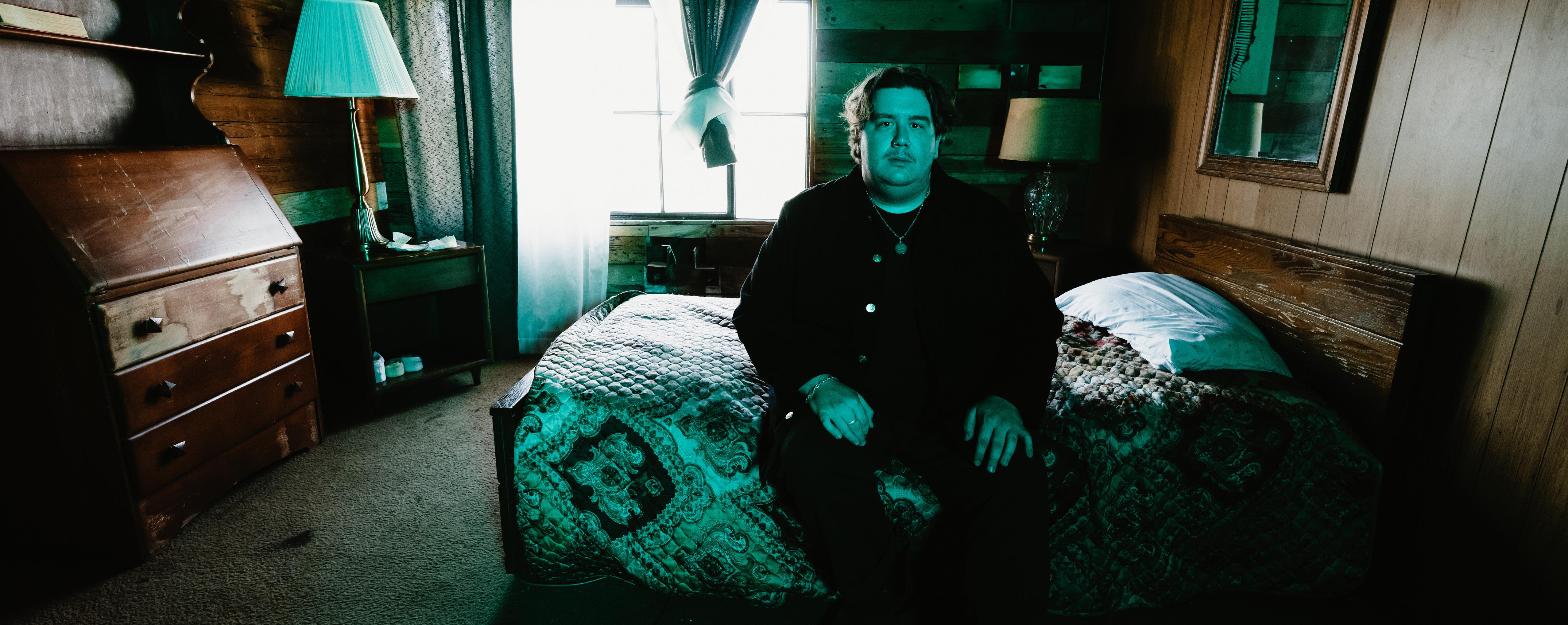
As Northbound continues to evolve as an artist, his unwavering dedication to his roots and authenticity remains at the forefront of his work. Despite the challenges of navigating an ever-changing music industry and the demands of maintaining an online presence, his commitment to creating music that resonates with his personal experiences and his audience’s nostalgia is evident. With each album, Northbound not only pays homage to the mid-2000s pop punk era but also carves out his own unique space within it. His journey is a testament to the power of staying true to oneself while embracing the influences and inspirations that shape one’s artistry. As fans eagerly anticipate his next moves, Northbound’s music continues to serve as a heartfelt reminder of the enduring spirit of pop-punk.
INTERVIEW AND PHOTOS: Heather Koepp
CASSADEE P OPE
Cassadee Pope’s career has been quite remarkable.
She first gained recognition in the music industry as a member of the pop-punk band Hey Monday in 2008. However, the band decided to take an indefinite break in 2011. Subsequently, Pope auditioned for the NBC reality singing competition The Voice in 2012 and emerged as the victorious winner, securing a valuable record deal. Fast forward to today, more than a decade after she participated in the show, she is making a triumphant return to her pop-punk origins with her latest album, Hereditary, after exploring the country music genre.
When Cassadee first decided to pursue a career as a musician, she was inspired by Mariah Carey’s appearance on a TV special. She was drawn to Mariah’s joyful demeanor, beautiful voice, and overall presence, which made her want to pursue music. Starting at the age of four, she began taking voice lessons after her sister’s voice coach offered to teach her while her sister recovered from surgery. She vividly remembers feeling frustrated at first when trying to produce vibrato, but when she finally achieved it, it brought her immense joy and solidified her love for singing.
“When I was 13, I sang with a house band upon the suggestion of my local managers. They encouraged me to gain experience with live music. The band was playing at a high school party, and I sang “Semi-Charmed Life.” That moment made me realize that I wanted to be in a band. Before that, I had only sung to tracks, but from then on, I knew I wanted to perform with a live band.”
In her previous music releases, you can clearly hear Pope’s growth as an artist, showing how her music has naturally evolved over time. When she joined the TV show The Voice, she was open-minded about her musical direction and wasn’t sure which path to take. It was clear that she wanted to move on from her band, Hey Monday.
“I was unsure whether to pursue pop, rock, or country music, and my genuine evolution towards country music on the show was truly authentic. It wasn’t scripted nor a result of any influence from Blake. I had been singing country music since I was a kid, so it felt like a return to my musical roots.”
“As I navigated my career in country music, I felt like I found my niche within the genre, blending elements of pop, rock, and country. I even experimented with a pop-punk/country fusion, but it didn’t quite resonate, leading me back to rock music. I take great pride in following my instincts throughout this journey. While there were occasions when I ignored them, for the most part, I strongly believed in the decisions I made. Looking back, despite any missteps, at the time, it felt like I was pursuing what I truly wanted and needed to do.”
Pope explains, “I used to feel like I had to fit into a certain category and tried hard to make myself likable to others. I thought it was genuine at the time, but I had set many limitations for myself, which I now realize were self-imposed. I also feel like country music has a way of imposing boundaries on you. When I stopped worrying about that and allowed myself to engage in the songwriting process freely, I found myself naturally gravitating back towards pop-punk. That’s when I wrote a song that I feel solidified my return to the genre.”
In early January 2022, Pope co-wrote a song with her friend Ali Tamposi, which became the main track for the album. They wrote it just for fun and without any specific goals in mind. “It was the first song I saw myself embracing that genre again, and it felt really good. So, I continued in that direction, and before I knew it, I had an entire album finished, and things just progressed from there,” she explained.
“Even though there are songs about heartbreak, self-sabotage, or insecurity, I see it as an expression of my self-awareness and acknowledgment of areas I need to work on.”
The creative process of Hereditary was fun for the singer/songwriter. She made it a family affair by working with people she had known for years. Working with a childhood friend from West Palm Beach, Florida, Ali Tamposi, brought that sentimental touch to the album, which was really important to the direction of the album.
Jaime Zeluck, founder of NonStop Management, helped organize recording sessions that took Cassadee to Los Angeles to work on writing and vocal recordings for her album. Cassadee said, “I wrote all the songs in person with everyone, and we recorded the vocals and the basic elements of the songs in one day. I was thrilled with the vocals that ended up on the record when it came time to choose the songs for the album.”
adding to the overall spookiness of the video.
“When I look back at the process of creating the record, I realize that I have gained a lot of selfawareness over the past couple of years. I often felt a sense of clarity throughout the whole journey. Even though there are songs about heartbreak, selfsabotage, or insecurity, I see it as an expression of my self-awareness and acknowledgment of areas I need to work on. It’s also about recognizing what makes me unique and expressing my emotions.
I’m embracing a darker aesthetic with blacks and dark blues while incorporating fun monochromatic moments with my pink hair. Even the love songs intentionally have a touch of bittersweetness, as they reflect that outlook.”

Pope reached out to Daisha McBride, also known as “The Rap Girl,” for a collaboration on her track “I Died.” McBride was excited about the partnership, and they teamed up with Pope’s friend Jake, who skillfully produced the track. When discussing the “I Died” music video concept, Pope shared her vision, saying, “I connected with Ed Pryor and shared my concept. I envisioned a dark and mysterious vibe - a mix of Hot Topic and Blair Witch Project, with some eerie graveyard shots. I wanted the video to convey a sense of death without being overly scary.” Pryor suggested using a camcorder and came up with the idea of depicting Daisha and Pope as willing ghosts haunting their exes. They filmed the video in the woods outside of Nashville from 9 P.M. until midnight, using fog machines to create an unsettling atmosphere. The fog became so thick at one point that they couldn’t see what was in front of them,
INTERVIEW: Danielle Taylor
Pope’s heartfelt message to her fans and listeners about her album Hereditary is centered around finding comfort. She opens up about how she hopes her audience will find solace in the inner thoughts and emotions she expresses through her music. She reveals that many of the songs explore personal struggles and inner dialogues that she had previously kept hidden due to embarrassment or reluctance to acknowledge those issues.
Pope’s ultimate desire is for her audience to feel validated and understood through her music, as she candidly admits to her imperfections while striving to better understand herself for the benefit of her relationships and collaborations.
She stresses the importance of acknowledging one’s faults and hopes that by doing so, people will find the courage to embrace their imperfections and seek comfort in their own lives.
PHOTOGRAPHER AND WARDROBE STYLING: Heather Koepp
HAIR AND MAKEUP: Mx. Monroe James
Koepp
WHAT INSPIRED THE NAME BLUSHER? IS THERE A STORY BEHIND THAT?
JADE: It’s actually a title that I wrote down in a notebook as a potential song idea. We started developing the band around the time we started writing that song. We came up with a few band name ideas during that time, some of which were terrible. But as we were looking through our journals, we all paused and agreed, ‘Wait, this one makes so much sense, Blusher. I think it’s such a visual word, and it means so many things to us. It encapsulates that feeling of wearing your heart on your sleeve. You know, when you have strong reactions of either love, getting a bit flustered, or those times when your emotions reveal themselves and sit there on the surface.
IT’S BEAUTIFUL, AND I THINK IT FITS YOU GUYS A LOT. HOW WOULD YOU DESCRIBE YOUR MUSICAL STYLE TO A NEW FAN?
MIRANDA: That’s a great question. I would describe it as sparkly, gritty, euphoric, dancey pop for 2 am at the club or for crying in your bedroom by yourself. It encapsulates a range of emotions and reflects a blend of our three distinct personalities translated into music.
IT’S NOT EASY, BUT YOU GUYS HAVE FOUND A WAY TO BLEND EVERYONE’S VOICE TO CREATE A UNIFIED SOUND. IT SHOWS HOW CONNECTED YOU ARE TO ONE ANOTHER.
MIRANDA: Thank you. Lauren put it perfectly the other day, “You’re really just hearing our friendship come through in the songs,” and that is so true.
DO YOU HAVE SPECIFIC THEMES OR MESSAGES THAT YOU AIM TO CONVEY THROUGH YOUR MUSIC?
JADE: We want our music to feel like your best friend telling you a secret. We want to convey how powerful and important friendship, especially female friendship, is. We also want people to feel their most empowered, confident, and chaotic selves when they listen to our music. Hopefully, it inspires you to go out and make a bold move, like confessing your love to a crush.
LAUREN: I think something that we’ve discussed, both musically and lyrically, as well as in our live performances, is having a mix of powerful, hardhitting, distorted moments and beautiful, dreamy, glittery moments. It’s about expressing the idea that female emotion is complex and has many layers and depths. We look forward to showcasing this emotional spectrum more in our future work.
WHEN CREATING THESE AMAZING SONGS, COULD YOU WALK US THROUGH YOUR TYPICAL SONGWRITING AND RECORDING PROCESS?
LAUREN: Our process varies each time, but there’s a loose structure that usually involves a lot of caffeine and an international flight in the middle. It usually starts with one of us sharing a story or something going on in our lives at the time.
MIRANDA: I think our process is unique because there are three of us, and we are all equal songwriters. We like to contribute to both the lyrics and the melody. It’s a unique setup because sometimes, one of us will start singing a melody, and another person’s melody will be added in. It’s like all three of our brains are working as one to create these melodies together.
YOUR UPCOMING SINGLE, “OVERGLOW,” IS SET TO BE RELEASED SOON. COULD YOU SHARE MORE DETAILS ABOUT IT?
MIRANDA: The process began with the three of us together at our studio in Melbourne, where we had lots of coffee and experimented with synths and vocal samples. We recorded parts for it backstage at a show while on tour across the US, filmed a visualizer for it in Tokyo, and it was mixed in London.
LAUREN: We brought a lot of fun energy into the studio for this project. I started by singing random sounds into the microphone and creating a production base. Then Jade came in with an incredible chorus melody, a turning point in the session, and gave us that ‘aha!’ moment. We started touring while recording that song, so Miranda recorded the bass backstage. The songs have traveled all over the world with us. It’s really cool to see them evolve from that first day and that initial exciting feeling into something tangible and refined.
WHAT HAVE BEEN SOME OF THE MOST REWARDING MOMENTS IN YOUR CAREER SO FAR?
JADE: Well, we just finished our first US tour, which was a massive moment for us. On the last night of the tour, we performed in Texas, and it was just a big celebration. We gave so much of ourselves physically and emotionally during this intense period of our lives, from being in a van every day to being on stage every night and experiencing that high and meeting all of these new fans after the shows. I think that whole experience was really wild and mindblowing for us.
MIRANDA: Recently, after playing some shows in Australia, a fan approached us and said we were the first female-fronted band they had ever seen live. It was a pinch-me moment. It’s incredibly rewarding when people express that we inspire them or want to pursue music because they have seen women like us showing them it’s possible.
JADE: Oh, and seeing people singing our lyrics for the first time.
LAUREN: Some of my favorite moments are the small ones in the studio when one of the other girls is fully immersed in her creative energy and vulnerability. Traveling together is special, too. For example, on our first tour of the UK, I remember one day in Cardiff when we were walking around the castle, and it started snowing during the Christmas markets. Stopping and appreciating how far we’ve come was a beautiful moment. It feels surreal to see such a big, seemingly delusional dream actually come true. I’m currently staying at my parents’ place, where I’ve kept all my old journals filled with dreams that are now becoming reality. I remember wanting and wishing for all this so badly that it’s surreal to think about now.
DO YOU HAVE ANY FUNNY OR EMBARRASSING STORIES FROM YOUR TIME IN THE BAND?
LAUREN: The first time we went on a red carpet and experienced a really luxurious party, we all fell down a staircase, individually, at different times within a 12-hour period. I think that’s an important one for the books.
MIRANDA: Somebody got us to sign a Pokémon card the other day. That was pretty interesting.
DID IT HAVE Y’ALL’S FACE ON IT, OR WAS IT AN ACTUAL POKÉMON CARD?
LAUREN: Right, what was it? A dragon or something?
MIRANDA: I can’t remember the card, haha.
IT’D BE COOL IF IT WERE A CUSTOM-MADE BLUSHER ONE.
JADE: Oooh, what would that look like?
MIRANDA: Three-headed. We have signed some pretty wacky stuff like people’s bald heads, but this one time on tour in the States, this guy asked us to sign his passport. That was crazy. I was like, ‘Are you sure? Will that affect your ability to travel? Are you sure?’. And he was like, ‘Yes! Just do it!’ And I was like, ‘All right. Sorry if you get like trapped in the country.’
HOW DO YOU ALL PREPARE FOR A LIVE SHOW?
JADE: Before the show, we work on warming our bodies with crazy exercises. Getting our muscles ready to support our voices is essential since the show is physically demanding. We listen to music that hypes us, whether musical theater or a club mix. We also prepare a lot of manuka honey, lemon, tea, and steam.
LAUREN: Before we go on stage, we’ll also do a ‘Yee-Haw!’
MIRANDA: Yes! This is to remind us to have cowboy energy while on stage!
WHAT ARE YOUR THOUGHTS ON THE CURRENT MUSIC INDUSTRY LANDSCAPE? ESPECIALLY FOR NEW ARTISTS?
JADE: I think women and pop music are currently dominating, and it’s fantastic to see artists like Chappell Roan, Sabrina Carpenter, and other megawomen in the industry doing so well.
LAUREN: It’s an exciting time for pop music because there isn’t a set structure for what a pop song needs to be. There’s a lot more experimentation happening now, and various types of music can gain recognition through social media. It’s really exciting to see pop as a space without limitations.
MIRANDA: I feel that nowadays, artists have access to technology that gives them more control over their creative vision. For example, you can learn music production on YouTube or design a logo yourself. When we started the band, we created our logo ourselves, even though I didn’t know how. Traditionally, pop music has required big budgets and tremendous efforts, but now people have more agency and control over their creative vision. This makes it very empowering for people to express their creativity.
HOW DO YOU LEVERAGE SOCIAL MEDIA AND DIGITAL PLATFORMS TO CONNECT WITH FANS?
MIRANDA: I feel like it’s constantly evolving, and you’re always figuring out where your head is and how you want to communicate with people. But it’s such a cool and helpful tool to connect with people by getting on social media, being a bit silly, and just being ourselves. It’s basically impossible for us to filter ourselves, even if we try, and that’s how we like to relate to people. It’s really lovely to get DMs from people telling us that they enjoy listening to the music or what the songs mean to them. We always sit there and read through them all, and it just means a lot to us to hear from the fans.
WHAT DOES THE REST OF THE YEAR LOOK LIKE FOR BLUSHER?
JADE: We have some awesome visuals coming out for our next singles. We also have some live shows in the UK, including performances at Latitude and Pride and our first headline show in London. In addition, we have been working on some remixes - we’re remixing our music and working in the studio on new material. We have a hectic and exciting year ahead!
As Blusher reflects on their journey, it becomes evident that the bond between Jade, Miranda, and Lauren transcends music. It is rooted in cherished memories and shared experiences. Whether in the intimate moments of the studio or while exploring new cities together, these instances highlight their profound connection and appreciation for their collective growth. Their stories are brimming with authenticity, humor, and genuine surprise at their escalating fame. Looking ahead to an exciting year of releases and performances, it’s undeniable that the trio is a dominant force in the resurging pop music scene—a testament to their friendship, resilience, and unfiltered approach to music and life.
INTERVIEW: Heather Koepp
PHOTOGRAPHER AND WARDROBE STYLING: Heather Koepp
KEY HAIR AND MAKEUP ARTIST: Mx. Monroe James HAIR AND MAKEUP ASSISTANTS: Ariel Alvarez & Jocelyn Sfetcu
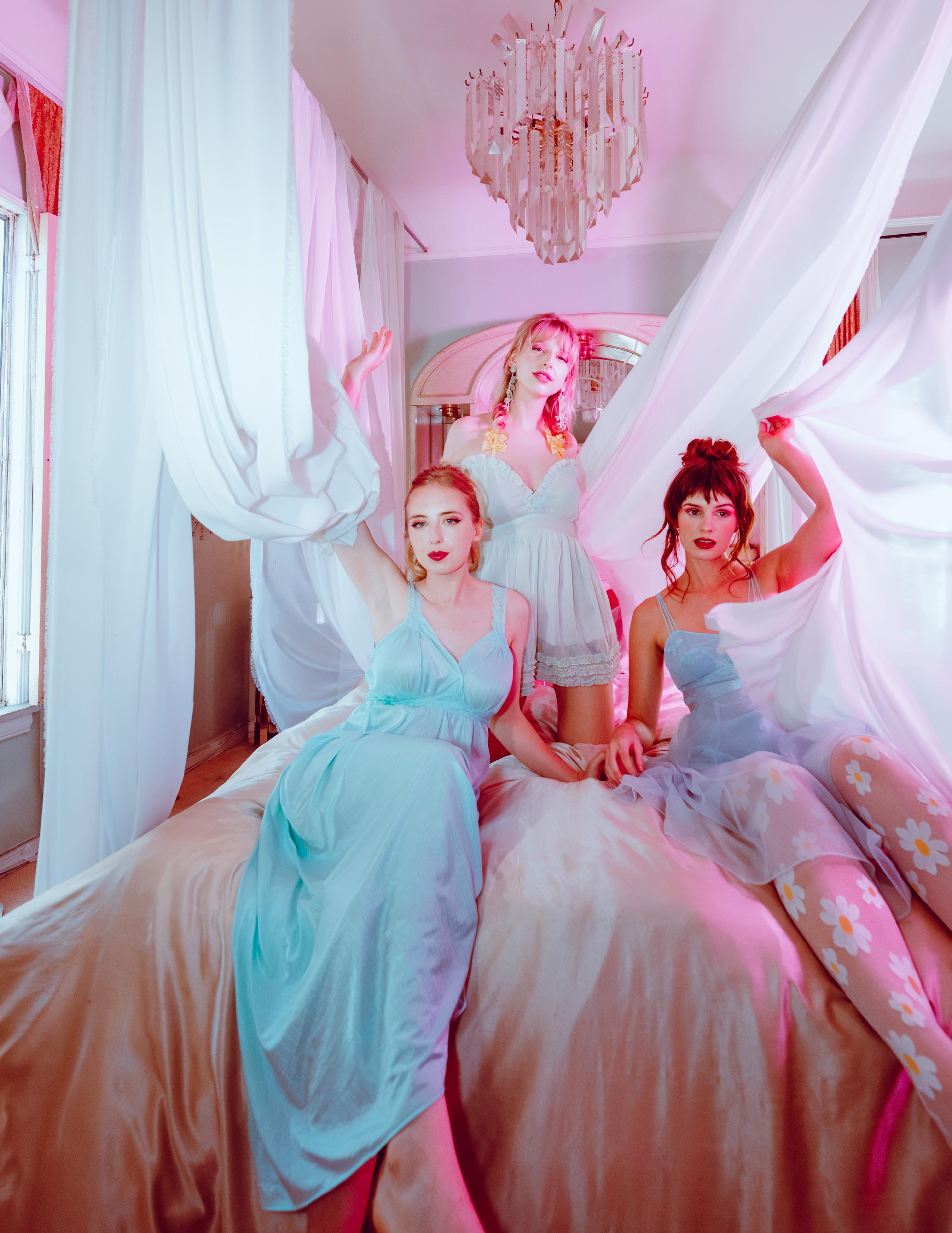

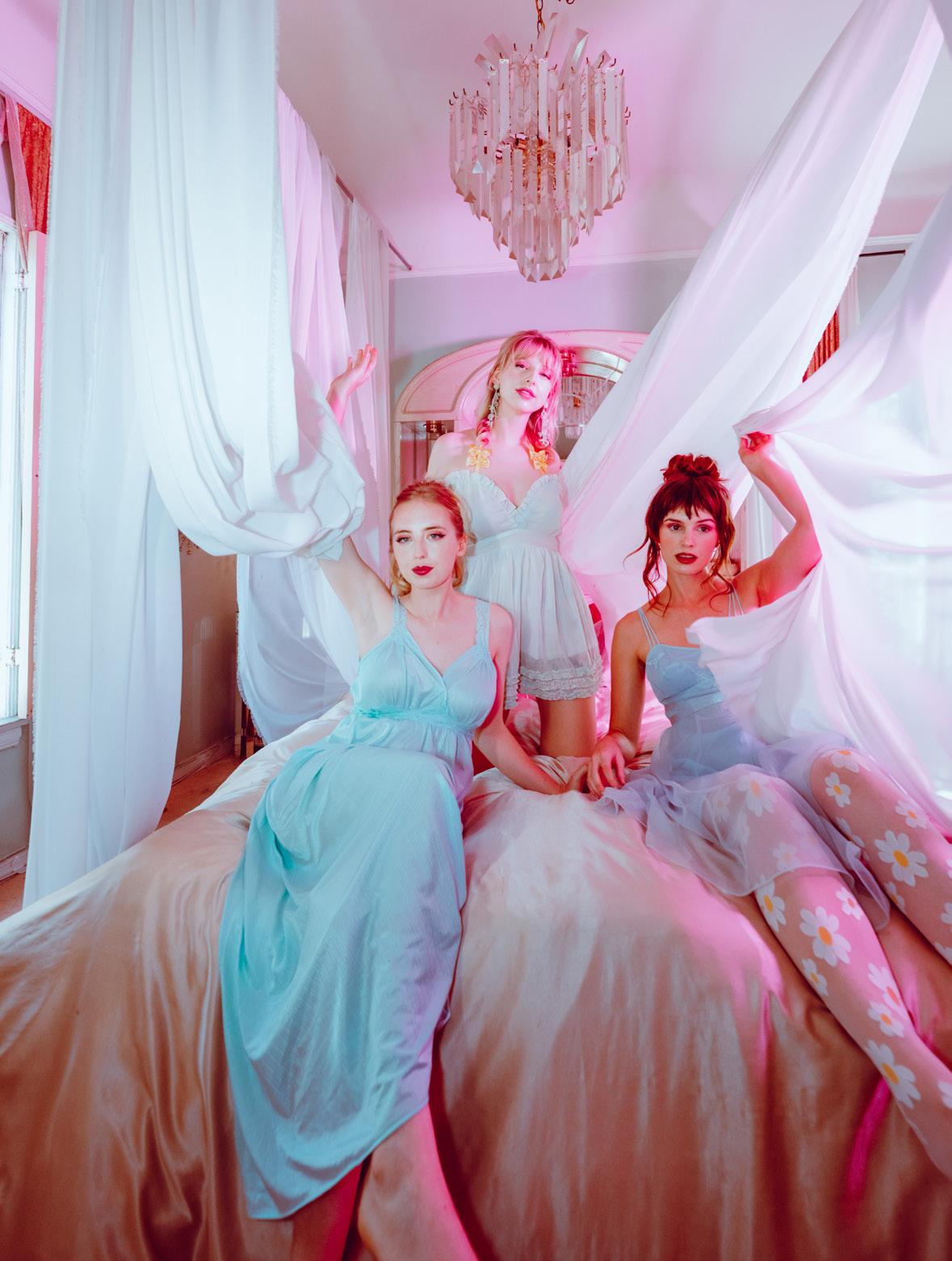
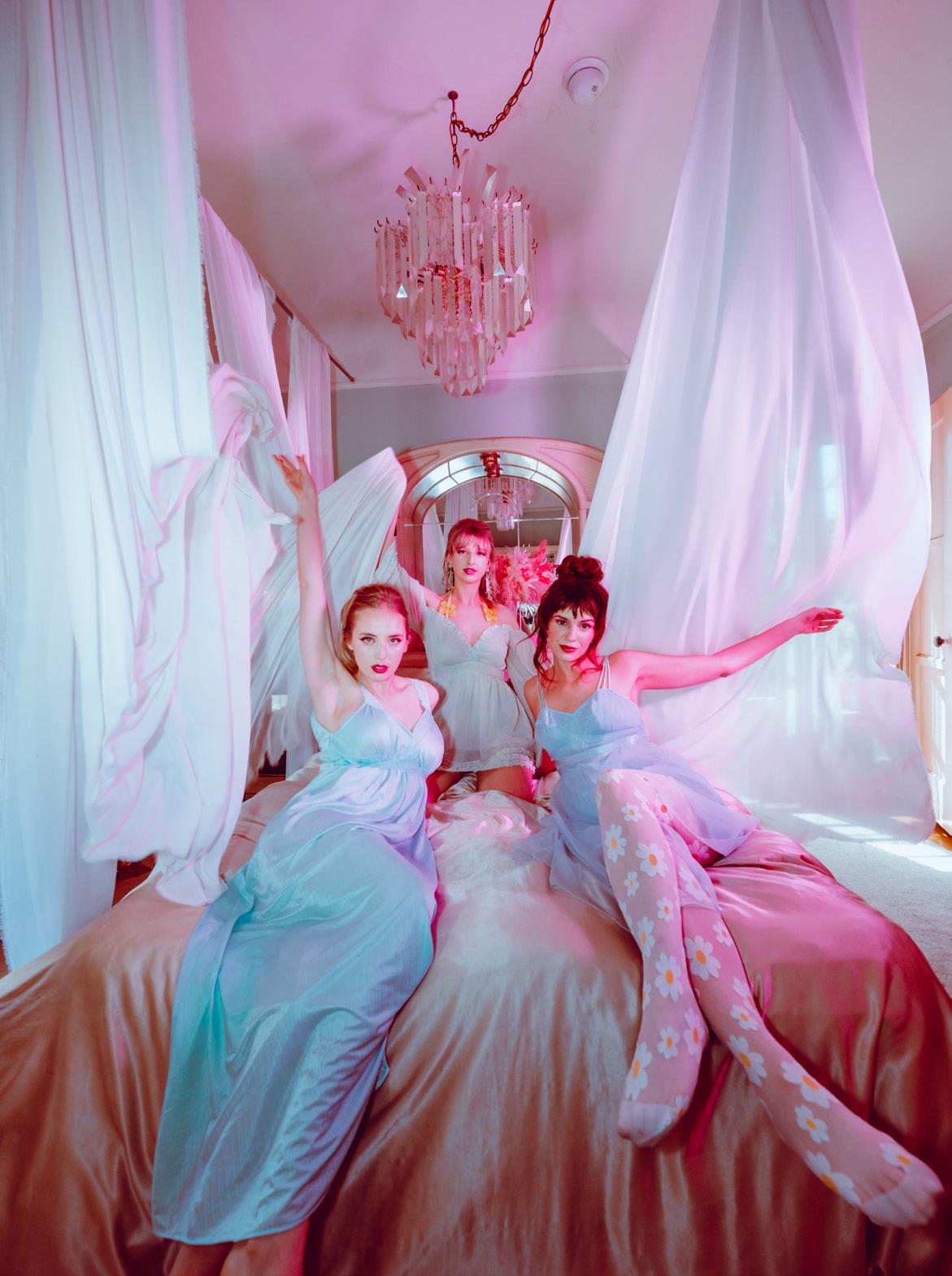
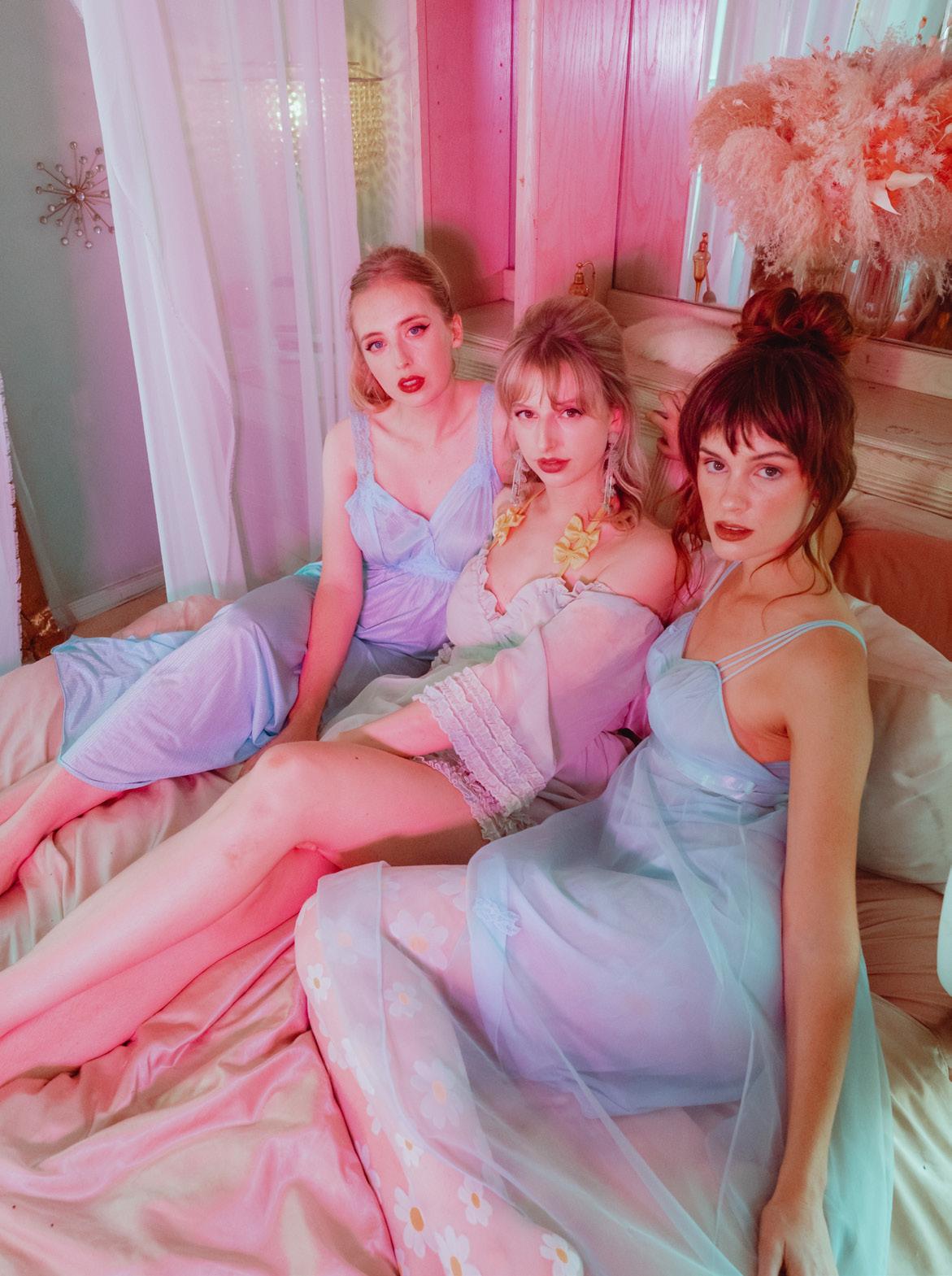
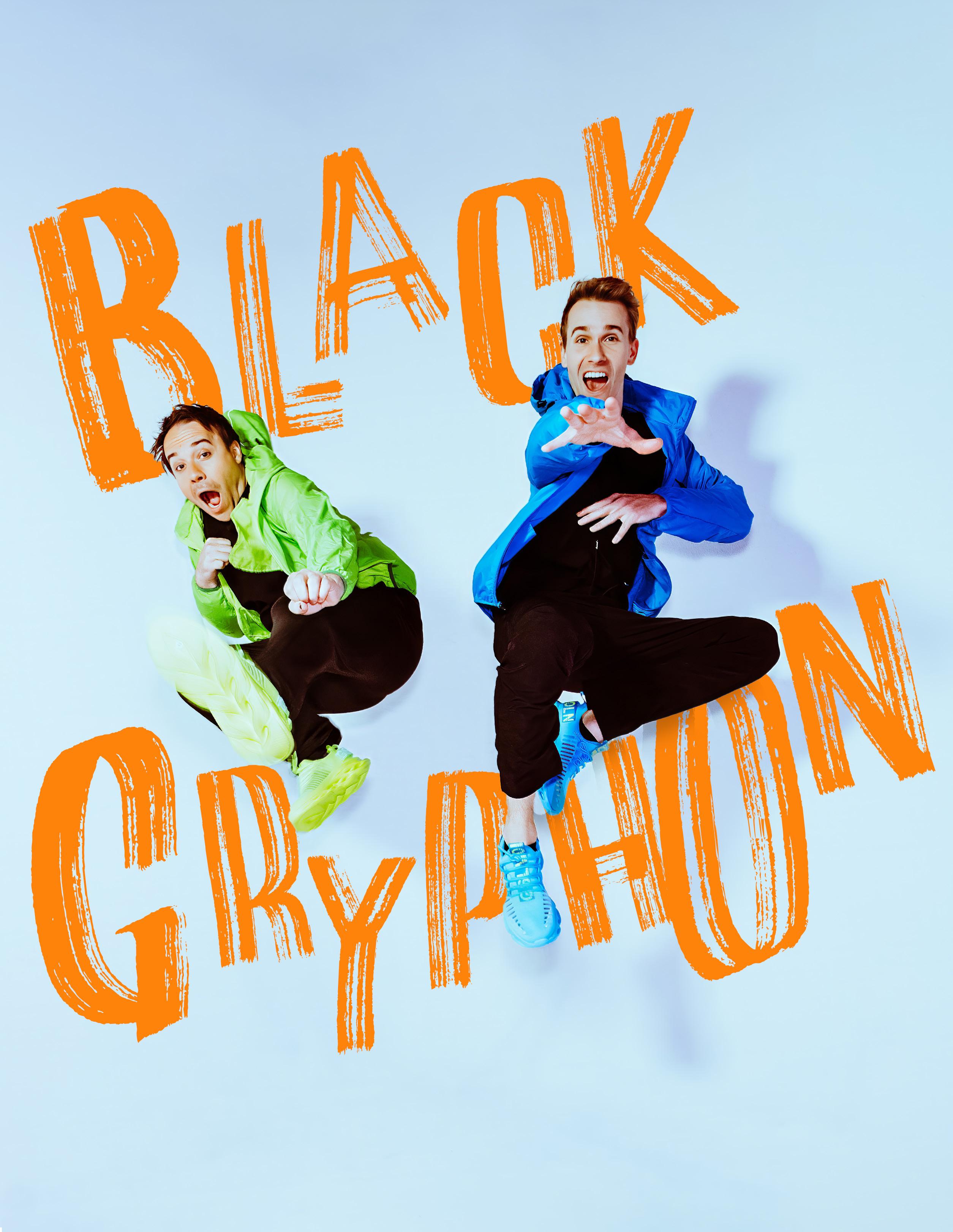
Gabriel Brown also known as Black Gryph0n, is a multi-talented musician, voice actor, and YouTube personality with an impressive array of accomplishments including a YouTube channel that has amassed over 4.9 million subscribers. Now collaborating with his brother Nathanael, known by his stage name Bassik, the two have joined forces under the collective name Black Gryph0n to bring a different wave of music to the masses. Nate’s background includes a deep proficiency in classical piano, as well as self-taught mastery of various other instruments such as guitar, bass, drums, and keyboard. His diverse skill set and innovative approach to music production have been crucial to the duo’s success. This collaboration has already led to some impressive milestones, including their first major hit single “Insane,” which went viral, earning them a gold record and over a billion streams. Using this formula, their subsequent songs also became hits, cementing their place in the music world. Join us as we unravel the inspiring journey of Gabe and Nate, exploring the defining moments, challenges, and triumphs that have shaped their extraordinary careers.
CAN YOU INTRODUCE YOURSELVES AND TELL US ABOUT THE BAND’S BACKGROUND?
GABE: Oh, boy. Do you think we can keep this to half an hour?
NATE: No, we never do. We love talking about ourselves.
GABE: Well, I love talking about myself, and then Nate corrects me when I exaggerate. Nate and I have been making music together since childhood. Our mother heard us singing at ages eight and six and encouraged us to pursue it. Nate excelled as a classical pianist, winning national competitions before turning ten, and has an exceptional talent for playing music by ear. He expanded his skills in his teens, mastering various instruments, including piano, strings, drums, bass, guitar, and keyboard. Throughout our youth, we performed in numerous shows
across the country. Eventually, we both joined the military for stability and new challenges. I trained to become a Navy SEAL, while Nate attended the Naval Academy to be a fighter pilot. Unexpectedly, we continued exploring our passion for music in the military.
NATE: While attending the Naval Academy, I joined their only two music programs, the Drum and Bugle Corps and the Men’s Glee Club. I signed up for both because I needed music in my life, even if it meant singing hymns and playing some not-so-great songs. However, both activities were rough, so I knew I needed to find something else. I found a radio club that used to broadcast music from the Naval Academy to the midshipmen on campus. However, the frequency had been retired for several years. I convinced the person in charge to give me access and turned it into a DJ club
to teach kids how to DJ. We organized pep rallies and other events outside the academy, what started as a way for me to listen to music as a freshman grew into a 30-40 member club that is still active ten years after I graduated
GABE: Nate established Navy Beats at the academy, bringing in major artists like Maroon 5 and Katy Perry to perform. Meanwhile, I was stationed in Yokosuka, Japan, where I was the lead singer for the Seventh Fleet Band. My job was to tour the eastern hemisphere and perform in the native language of every country that I visited. I can sing in 12 languages. I was later selected for the Electric Brigade, the band for the Naval Academy and the President, but their funding was cut, so I left that job. I moved to Vancouver and ventured into voice acting while Nate completed his service.
GABE, I READ THAT YOU WERE INVOLVED IN A SKYDIVING ACCIDENT AND BROKE YOUR FEMUR. I’M CURIOUS TO KNOW MORE ABOUT IT IF IT’S NOT TOO TRAUMATIC.
GABE: During my military training, while skydiving, my canopy malfunctioned in a way called a “line over.” At first, I thought it was a stuck slider, a problem that can usually be fixed. However, I only realized my mistake when I was already below the decision altitude. At that point, a skydiver must decide whether to cut away and deploy the reserve parachute or use the main one, as it’s too low to deploy the reserve safely. I struggled to control the partially inflated canopy and ended up hitting the ground at around 60 miles per hour, resulting in a broken leg. It’s the same leg that I had broken about five years prior in Alaska when I was free-climbing a cliff. Nate saw that one; I fell from about 45 feet and snapped my left femur. If you understand why it happened, it’s less scary; you learn from that hubris, and you can do it safely in the future. I’ve been skydiving and flying for the last eight years, and I haven’t injured myself again because I’ve learned from those mistakes. There are safe ways to do risky things, so it’s all about risk management.
I’M IMPRESSED BY YOUR DETERMINATION TO PURSUE YOUR LOVE OF EXTREME SPORTS DESPITE YOUR FRIGHTENING PAST EXPERIENCES.
GABE: It was scary the first time I returned to it, but Nate would have done the same thing. I think that drive has contributed to our success. We’ve experienced multiple failures in the past 15 years while trying to establish ourselves and create music that people would enjoy. The only difference is that when you fail in a skydive, you may break bones or die, but in music, it only hurts your pride, which can sometimes be worse.
IT SEEMS LIKE YOU HAVE PERSONAL EXPERIENCE IN THIS AREA. HOW DO YOU HANDLE YOUR PRIDE BEING CHALLENGED IN A CREATIVE SPACE?
GABE: We’ve encountered numerous occasions when our seemingly fantastic ideas didn’t pan out as expected. However, it’s taught us that our lack of success isn’t necessarily due to a lack of talent but may be influenced by factors such as market conditions and timing. From our failures, we’ve gained valuable insights. We’ve realized that some of our songs should have been hits, but factors like poor timing, lack of market demand, or competition from other companies hindered their success. However, through careful analysis, we’ve identified strategies to enhance the visibility of our music.
NATE: The failures can pile up and make you feel like you can’t dig yourself out from under them. Doubt also has a way of sneaking in at times, and we’d ask ourselves if we could do this full-time and do it successfully. We don’t have any friends or family who have done entertainment, so we didn’t have a rulebook to follow, which is tricky. We had to pave our own way. But through a lot of trial and error and then experience, I think we’ve eventually made it work. Overall, I believe that all those setbacks were necessary to get to where we are now, and it’s something we’re grateful for.
GABE: We’ve learned many things the hard way. When I entered the voice acting world and Nate entered the production world, we observed people doing things we knew didn’t work because we had already tried them. We have embraced the concept of failure and believe that the only true failure is if you give up or don’t learn from it. With our experiences, we have created a roadmap that helps us navigate better.
DO YOU THINK YOUR TIME ON AMERICA’S GOT TALENT (AGT) BENEFITED THE GROW OF BLACK GRYPH0N?
NATE: I wish I could say it was more helpful. They seemed to have a particular idea of who they wanted to cast. Many people don’t realize that reality TV is cast, but they have a specific slot to fill. When we suggested going on the show as Black Gryph0n and Baasik, they said it was too complicated and instead gave us a name that showed we were brothersBrown Brothers.
GABE: During the eliminations, we were favorites among the audience and received a standing ovation. The audience was chanting ‘buzzer, buzzer,’ but unfortunately, they didn’t have any golden buzzers to give us, so we were eliminated in the semifinals. Simon acknowledged the standing ovation we received but credited the production team for our act,
saying, “I didn’t know what you were doing, but you got really lucky because the production team made you look incredible.” I was just like, ‘wow’…
I TAKE IT YOU WEREN’T TOO DISAPPOINTED THAT YOU DIDN’T MAKE IT FURTHER AFTER THAT COMMENT.
GABE: We were surprised even to make it to the semifinals because we weren’t what they originally wanted. The following year, we performed a lot at corporate gigs as the Brown Brothers. It was a little frustrating because suddenly, everyone wanted to see us live because of AGT, but nobody knew any of our stuff outside of AGT. However, we started meeting fans who started recognizing us from our YouTube videos.
NATE: Being successful on AGT can be consuming because opportunities are somewhat limited, consisting primarily of corporate gigs and a Vegas residency. Gabe and I had previously tested out a Vegas residency when we did a trial run with a Cirque de Soleil show at New York, New York. However, we felt overwhelmed by the idea of a six-month residency. The demanding schedule of 10 shows per week was exhausting, and we realized that we couldn’t commit to it. We got bored on the second night, and Gabe and I were like, “How are we going to do this for six months?” Honestly, there’s
no amount of money in the world that would have led us to sign that contract.
GABE: The experience dismantled the fantasy and the prestige of having a Vegas residency. When you win America’s Got Talent, they promise you a year of Vegas residency, and it’s hyped up to be this massive thing, and it just isn’t. Not for us, anyway.
YOUR UNCONVENTIONAL APPROACH TO MUSIC SETS YOU APART. HOW DO YOU MAKE IT WORK INDEPENDENTLY AND AS A DUO?
NATE: Gabe and I have a unique approach to pursuing music, and it’s difficult for people to put us in a box and dictate what we should do. I’ve realized that being a talented musician or songwriter isn’t enough. Understanding the business side of the music industry and positioning oneself for success is equally important. Gabe and I have autistic qualities and faced challenges with social interactions and have had to grow beyond our comfort zone. The label that signed me wanted me to fit into their usual mold, but I couldn’t do that. I wanted to do my own thing. So, I tried to do what they wanted occasionally, but I also pursued my own creative ideas. This caused friction and didn’t work well for the label or me. Gabe had a similar experience with voice acting.


GABE: I didn’t want to be limited to specific roles and I kept getting typecast. I knew I had more to offer. Our business approach differs from traditional bands. While traditional bands are easily recognizable by their sound, I take pride in the diversity of our recent releases. We use different voices and production styles, featuring various artists, and work in other genres. Our versatility sets us apart, making promoting ourselves as a band challenging.
MOST ALBUMS ARE DESIGNED TO HAVE A COHESIVE STORYLINE WITH CONSISTENT DYNAMICS, SOUNDS, AND BASS LINES. HOWEVER, CREATING A MIX OF RANDOM TRACKS CAN EVOKE A NOSTALGIC MIXTAPE OR CD VIBE, WHICH MUSIC LISTENERS CAN APPRECIATE.
GABE: That’s what we’re hoping for as we try to grow the brand. We feel that we have reached a point where the music has grown as much as it can in its current form. Our biggest challenge is that we don’t want a consistent sound; instead, we aim to produce music in multiple genres. We want to operate Black Gryph0n more like a label while still having the fanbase of a band. This is the challenge we are facing.
IF ANYONE CAN MAKE IT HAPPEN, IT’S YOU. YOU ARE SO CONNECTED. DO YOU EVER DISAGREE ON IDEAS?
NATE: Oh, Gabe and I constantly butt heads. We were homeschooled, which turned out to be a huge blessing. It allowed us to get to know each other better, understand how we work and write, and recognize our creative differences from a young age. I don’t think two people on the planet are closer than Gabe and I. We can basically speak telepathically.
GABE: It was a lot tougher in the beginning, 15 years ago, when we were first starting to write because we were both figuring ourselves out and then how to make music together. I think we learned early on not to take creative differences personally.
SINCE YOU BEGAN, HOW HAS THE MUSIC INDUSTRY EVOLVED?
NATE: I’ve noticed a positive shift in the music and entertainment industry towards being more open to sharing techniques and building community, which I love to see. In the past, I remember being in sessions where I would ask a producer how he made a certain sound, and he’d respond with, “I can’t tell you that. That’s my secret”. It created a strange atmosphere. However, I don’t see that nearly as much anymore. Gabe and I are very open about how we do things because we believe it’s not just for us. There’s not a finite amount of money; it doesn’t just go into our pockets. This is a way for music to progress, communities to be supported, and different people to connect. The more people who embrace this mindset, the better.








